#the emotional nuance in terms of relationships and character experience was often really complex
Explore tagged Tumblr posts
Text
welp, the full story involving poly relationships and the possibility of an abortion took no risks, but I think the stance that they were legitimate and morally neutral life options wasn't undone. It felt like a step, albeit a baby step.
and of course no real apology or remorse from Gyu Hyun toward Hae Yeong for her demotion, despite her being not at all involved in the situation with Ji Uk working at the company. And yet Ji Uk kinda got one regarding how he had been treated by Gyu Hyun.
But Hae Yeong did get his money and is no longer working for him and has her own company so that is definitely a win for her.
My favorite part of the ending was actually the noble idiocy, which I didn't think I would ever say, but in this case Hae Yeong rightly identified how much Ji Uk had lived his life by what other people wanted and had never had the space and opportunity to figure out what *he* wanted.
There was so much emotional weight between them, wrapped up in these complex relationships with parents and parental figures. I think it was really important for the drama to show that Ji Uk was not with Hae Yeong simply due to some sense of obligation or because he was trying to fill a hole his family left.
The time apart felt like a good thing for them to consider what they both needed and to address some of their unfinished business so that they could come back together again.
#no gain no love#spoilers#there were some really nice things in this drama that I hadn't seen done very often if at all in others#the emotional nuance in terms of relationships and character experience was often really complex#I definitely would rewatch this one
45 notes
·
View notes
Text
LGBTQ Manga Review - Still Sick Vol. 2

Still Sick Vol. 1 was a highlight for me last year. I immediate fell in love with the complex characters and storytelling and, based on the first volume, I believe that Akashi has created one of the best shakaijin Yuri (Yuri works featuring romance between adult women, often in the workplace) out there. The series took a very typical office romance story and infused it with several unique elements, like a very meta understanding and portrayal of Yuri and Yurijin. On top of all that, Akashi demonstrated an apparent willingness to tell emotionally varied and impactful stories with subtlety, a trait often missing from more ham-handed Yuri melodramas. We, as an audience, could grow in our understanding of the characters, their backgrounds, and their neuroticism rather than have it all apparent for us. The second volume has done little but confirm to me that my initial reactions were right on the money. With Still Sick Vol. 2, Akashi delivers a stunning continuation to one of last year's best releases.
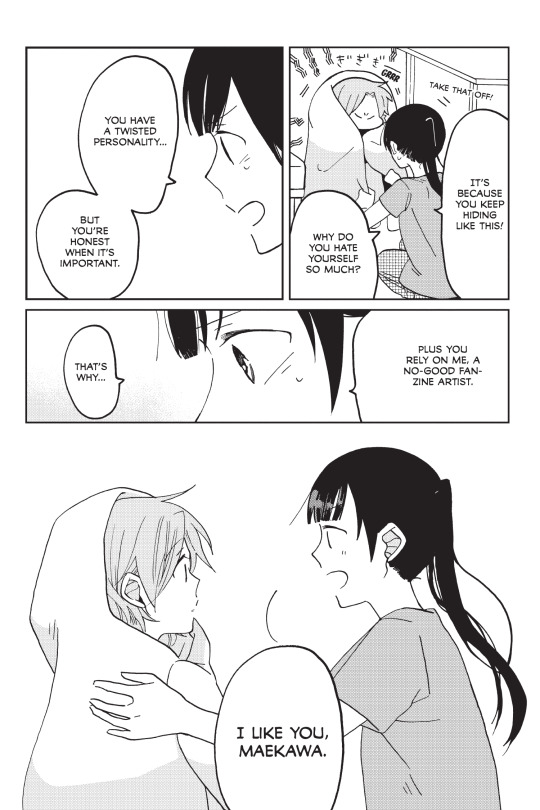
Still Sick Vol. 2 takes up directly where the first book left off, with Maekawa suddenly and somewhat cruelly kissing her friends and coworker Shimizu. The kiss was initially intended as a joke; however, it further confuses Shimizu as she struggles to comprehend her own sexuality and wishes to support Maekawa's efforts to reignite her former career in manga. Her conflicted feelings come to a head when, in a comfortable moment, she suddenly and accidentally reveals that she likes Maekawa. The following regret and discomfort are alarming human and relatable, as Akashi really captures the essence of a flustered lesbian. This confession acts as the catalyst for the dramatic transformation both characters begin to undergo as the story continues.
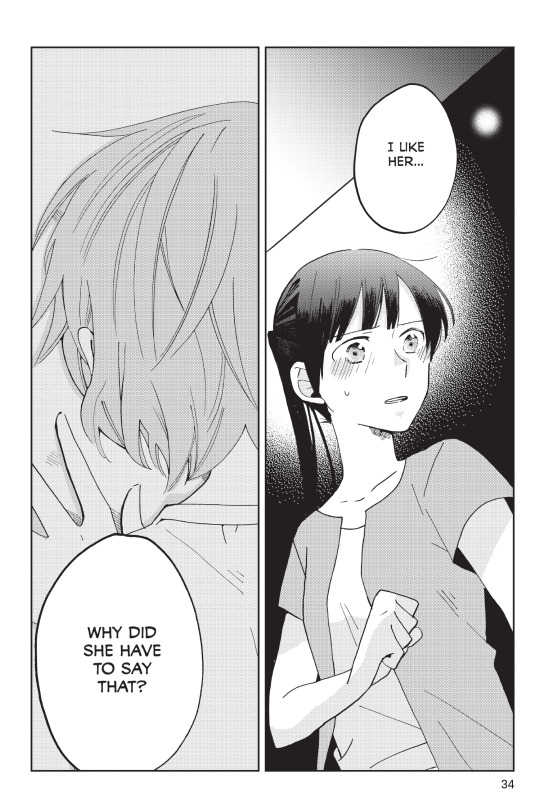
As in the first book, Maekawa is an irresistibly capricious and complex character. She acts exceptionally clingy around Shimizu in some moments, but in others, pushes her away. One of the best aspects of her character is that, just like the first book, each of her actions is not outright explained, nor are they random, but rather the appropriate reactions based on her somewhat twisted sense of self and the world. The more one reads into it, the more her varied, occasionally upsetting acts appear like those of a woman struggling to figure out what she wants out of life and out of her relationship with Shimizu. Early in the story, she and the reader have an epiphany that she wants to be loved. Still, throughout the story, her actions hammer home how alien and disconcerting the topic affection, romantic or otherwise, is for her.

One of the central conflicts revolves around Maekawa's manga, or rather, her writing the manga. Just as the first volume dived into the meta of the Yuri genre and its fanbase, this book details some of the struggles creators to feel when working on a project. For example, Maekawa makes multiple references to the balance artists, especially those working with publishers, must maintain between their inspiration and desires and their audience’s interests. She shows frustration with her work and sufferers from bouts of self-doubt and sadness when she hits blocks. It is all very realistic, and the reader gets a sense of the nuanced difficulties professional artists face.
The two plotlines, Maekawa's struggle to complete her manga and Shimizu navigating her feelings for her, are well integrated and support each other. If either element were absent, the other would have to be utterly changed, showing Akashi's storytelling ability. Shimizu's apparent greatest desire is to be there for Maekawa and support her work as a mangaka. However, through this support and want to be present, Shimizu has many of her more vulnerable moments, seeking to inspire her friend, which eventually leads to her confessing her feelings. On Maekawa's part, her work affects her character first and relationship second, the opposite of Shimizu, making for a nice contrast and more development for the often-flighty woman. The realization she has early in the story creates a conflict within her, expressed through her work and relation with Shimizu.

There is a constant push and pull between Shimizu and Maekawa, with each character taking it in turns to accept or reject the other. On Shimizu's part, this dynamic looks like her being there for Maekawa and enthusiastically supporting her artwork or avoiding her and using work as an excuse to back off. Maekawa, however, true to her character, is much more extreme in her actions, acting overly affectionate to Shimizu at times and openly hostile in others. The oscillating relationship continues as they both come to terms with their feelings, both romantically and around Maekawa's manga.
Akashi excels at justifying the varying actions of their characters while maintaining a sense of discovery and suspense for the reader. Only through deep and thoughtful readings can we hope to understand every action, but all the clues are there, making for an excellent repeat read and keeping the book in the audience's minds long after they put it down. However, sometimes, even having uncovered the reasons behind them, Maekawa can seem overly cruel and dramatic. It does not detract much from the overall work, but a few chapters hold a teetering balance just above falling into melodrama.
There is not much to say about the artwork that I did not mention in my review of the first volume. The character designs remain solid and consistent. However, the annoying lack of detail is even more apparent than in the first book. Panels often have a dull, empty feeling or fail to communicate the powerful writing's emotional tone. They are not bad, as previously said, they are consistent and keep the reader engrossed, but it is aggressively average.

One aspect of the art I will praise is its lack of service. Akashi treats their character and story with respect, and there is not even so much as a cleavage shot anywhere. The few moments which could contain sexual content, like when Maekawa embraces Shimizu and approaches for a kiss, are used much more for tension than service. It is perhaps the one area where the art begins to excel. The framing and expressions are all very carefully chosen to maintain the proper tone and avoid exploiting the characters. The best example of this is easily the onsen. At the height of their reluctant animosity at a company trip, Maekawa and Shimizu have to navigate being naked at the onsen together. The moment contains no sexual content but is excellently presented as an awkward experience to enhance tension, followed by some light comedy that brings the two women closer together.

Still Sick continues to amaze in its second volume. The tensions and stakes are much higher now, and the dramatic yet grounded relationship will enthrall readers as it develops. The Yuri romance integrates beautifully with a wonderful and incredibly meta plot about creating manga and all the turmoil the come with both. Akashi crafts a sophisticated and mature story that never lets up with twists and steadily progresses forward at a satisfying rate. This series is easily one the best shakaijin works out there and deserves hefty praise and enthusiastic investment from all its readers.
Ratings: Story – 10 Characters – 9 Art – 5 LGBTQ – 7 Sexual Content – 0 Final – 8
Purchase a copy of Still Sick Vol. 2 digitally or in print - https://amzn.to/2ZrErgn
Purchasing manga legally helps support artists and publishers
Review copy provided by Tokyopop
Support Yuri and LGBTQ news and review on the YuriMother Patreon
#reviews#lgbt#yuri#manga#lgbtq#still sick#lgbtq+#queer#gay#wlw#girls love#gl#lesbian#lesbians#romance#anime#art#comics
567 notes
·
View notes
Text
The Monoma Meta Nobody Asked For
I don’t remember who it was on Reddit that said it makes sense for Monoma to be one of the most empathetic characters in BNHA cuz of his Quirk, (his quirk allows him to walk in the shoes of other people in ways most will never be able to even if for 5 minutes at a time), but let’s talk about it for a minute.
Monoma is a character full of contradictions but there’s a method to the madness.
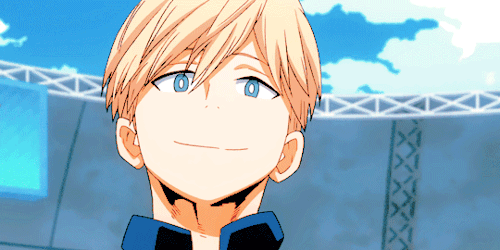
Let’s take a real deep look at the manga shall we?
It’s pretty much canon that Monoma trash talks 1-A so much in-part b/c he cares that much... too much... about his own classmates. It’s implicitly obvious based on the way he interacts with his classmates and phrases his rants at class 1-A.
The fact that he’s obviously influenced by Vlad is just the cherry on top.
He’s prideful of not just himself but also his friends. Let’s break down the nuances there.
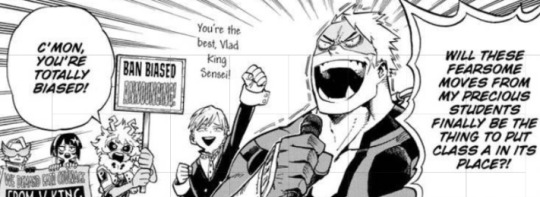
Ch196 above, Ch207 below.
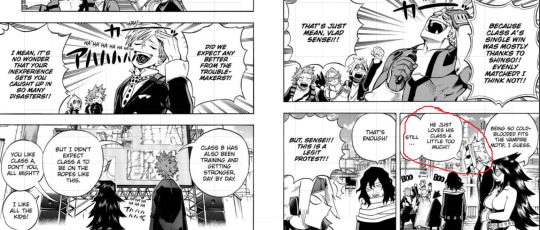
Empathy
The kid has a way with words.
The kid has a weirdly poetic way with words.
He goes out of his way to encourage or reassure his classmates in a deeply thoughtful manner at every given opportunity.

He hyped up Setsuna Tokage before her battle with Bakugo and we saw him grin in pride when Komori took down Tokoyami.
Whenever Monoma does criticize his classmates, it’s always frank, honest, but constructive, with the intention to help them improve. He’s even contrasted with his own teacher for being relatively more kind in the delivery of his criticism (see the next screenshot). Given that Monoma’s shown to be strongly influenced by Vlad, this particular difference stands out.
You never see an anime/manga character get fancifully philosophical & genuinely helpful like this unless they are an adult, usually the MC’s mentor. Monoma’s legit acting more like an anime mentor than any of Deku’s multiple mentors. lmfaooo.
Realistically speaking, all of this, the philosophical speeches & level-headed advice, takes an incredible amount of emotional & mental labor. The kid’s practically doing half of Vlad’s job for him.
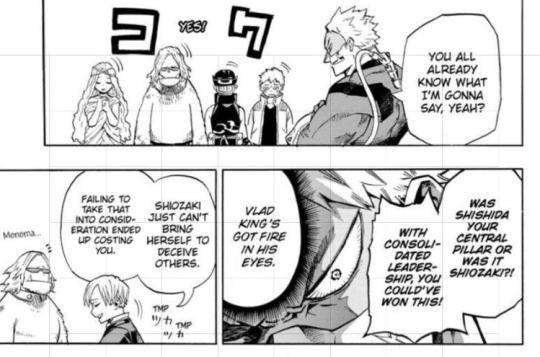
It’s during the joint training arc we begin to see why his classmates put up with him and are on friendly terms despite how obnoxious & cheesy he can be & how often they need to keep him in check.
It’s clear even as far back as the sports festival that his classmates don’t actually hate him, despite the smacks & tough love they also just shake their heads with a smile on their face as they say “sorry about him,” cuz that’s just the way he is. They love him anyways.
He’s an annoying little sh*t but he’s their annoying little sh*t. Perhaps they even realize why he acts the way he does towards class 1-A, it’s because he cares too much.
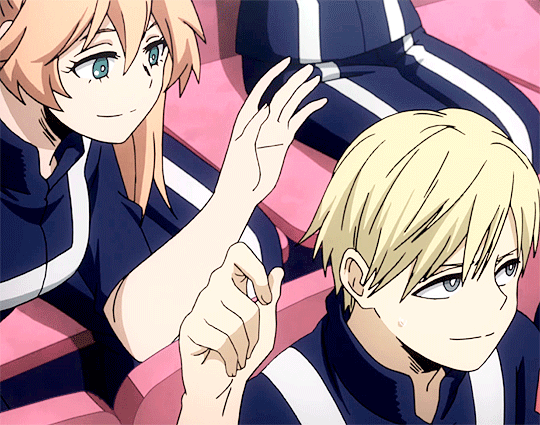
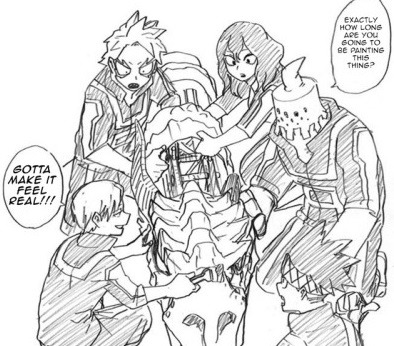
Sketch translated by @aitaikimochi
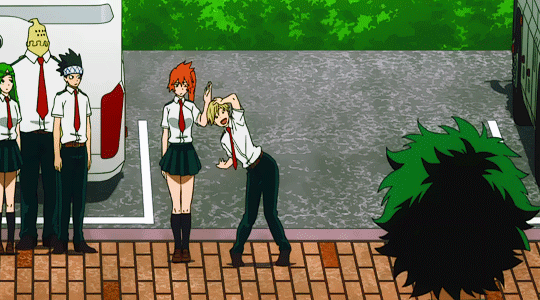
Putting Up An Act
I think there’s actually even more to it when it comes to his rowdy & brash behaviors.
Monoma is empathetic because of how his Quirk works. He needs to learn to use the Quirks of others in order to become a hero. In doing so he logically needs to become privy to all the Quirk’s weaknesses, not just their strengths. Not only does he need to become privy to these often deeply personal details of one’s lived life, he needs to experience them, even if for just five minutes at a time. It’s natural, even necessary, for Monoma to become exceptionally close to his classmates.
But he’s only like that because of how his Quirk works. It’s his naturally nurtured self. His conscious self, though, is notably different.

What we see when Monoma says he and Shinsou need to do unheroic things to get by is not his naturally nurtured self, but is a conscious decision.
At some point in his life, Monoma came to the conclusion that being too kindhearted all the time will be weakness. This is clearly implied, almost outright stated when we heard Monoma’s thoughts when faced with Deku’s Black Whip, “All of the hopes and dreams in my mind from when I was younger are gradually becoming these heavy burdens... like some sort of curse.” I am 99.999% sure it’s Monoma’s thoughts being shown there because the speech pattern & context don’t match up to Shinsou or Midoriya at all.
Basically, Monoma is a little sh*t because he saw his own empathy as a weakness, and overcompensates for it. He’s trained himself to be brash & mischievous, likely from a very young age given how consistently brash he is. We can see a little bit of this when interacting with his class-B classmates as well.

It was @thyandrawrites who first noticed this in this post, but here we see Monoma scolding Kendou after losing the beauty contest, giving perhaps too much tough love & TetsuTetsu steps in to Kendou’s defense.
Given how Monoma during the Joint Training arc clearly said everything he did to motivate his friends to do better, this is likely not an isolated occurrence. The dude cares way too goddamn much for anyone’s good.
Yet there’s something else up with the guy too, something else that contributes even more to his unhealthy obsession with the rivalry vs class-A. The dude has some serious self-esteem issues but is too prideful to seek real help.

Self-doubt
The fact that he’s the only member of class-B who failed the midterm despite having an intelligence stat of 5/5 speaks for itself.
Him failing the academic exam would be a sign of serious issues going on under the surface in itself, him failing the practical means he probably failed b/c he couldn’t hold his own and his teammate had to pick up the slack.
Him failing b/c he held back his teammate would have hit very close to home since we now know he was told “You can’t be a hero if you can’t do anything yourself” since he was a kid.
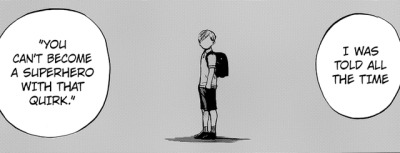
Basically, yet another reason he continues to antagonize class-A is a textbook example of someone pushing their insecurities onto someone or something else.
For something often played off as comedic relief there’s a lot of layers as to why Monoma does what he does.
But wait, there’s f*cking more. There’s actually a particular reason Monoma expresses his insecurities in this unhealthy manner, and that reason ties into what I’ve already begun to address about his empathy.
Another Act
I don’t think it’s accident that the first time we see him have a real heart-to-heart with someone is when he’s attempting to do it for the sake of someone else. Even if it is in a clumsy manner that ends up annoying Shinsou, it’s the intent I’m interested in here.
We almost never see Monoma receive or accept praise or reassurance, he’s always the one giving it. He always makes it a point to put himself in the position where he’s being the emotionally strong one.
He got over class 1-A securing their victory exceptionally fast, ready to put on a strong face for Tokage and the rest of his class.

The few times we do see him genuinely depressed, he’s distancing himself from others.
He’s afraid of holding others back not just as a hero, but emotionally as well. His instinct to be emotionally strong for the people he cares about stems not just from his strong empathy and caring nature nature itself, but also from his pride, insecurities and conscious decision to do everything he can do.
This is why he’s too prideful to seek or accept real emotional help & ends up venting his emotions in unhealthy & destructive ways.
His many depictions as an actor of sorts was intentional. He juggles many acts, he puts on an act of emotional strength for his classmates, and he puts on an act of cruelty to get by as a hero. To antagonize people in an attempt to throw them off their game. Sometimes... oftentimes even, he misapplies these charades & gets carried away. Oftentimes he fails entirely, he’s trying to do some hella complex things for a kid.
Finally, His Pride
Let’s not kid ourselves here, the dude has a major superiority/inferiority complex. He fails to see how needlessly cruel he’s being when saying class-A asked to be attacked by villains etc.
I’m willing to bet he’ll be in a phase denial for a while now that Class-B and Class-A have gotten more openly friendly in recent chapters. But because he cares so much about his classmates he’ll likely eventually come around to adjusting to a new frenemy relationship with 1-A... with much difficulty when we take his pride, insecurities & self-righteous envy into account.
He’ll probably end up being Tsundere about everything to protect his ego and so Horikoshi can keep using him for comedic relief lol. Even if he does realize a lot of what he’s done was f*ked up, he’s too brash of a prankster to ever go fully soft on them either.
TL;DR... Monoma is a piece of mf work. Not surprising really.
#I overanalyze the comedic relief character#Someone stop me#TJ overanalysis#bnha meta#neito monoma#monoma neito#monoma#bnha spoilers#bnha manga#bnha#My Hero Academia#boku no hero academia#class 1b#bnha class b#bnha class 1b#vlad king
524 notes
·
View notes
Text
The Wolf Reviewed
Spoiler-free section
My life is divided into two eras: ‘before seeing GG as Ji Chong’ and ‘after seeing GG as Ji Chong’. I will never be the same.
GG is magical in this series, and Ji Chong is among my absolute favorite characters of all time (I am actually in love with this character, which is heartbreaking given the fact that he’s fictional). The show also has many interesting characters and some exciting storylines, and in spite of some of its flaws this series is quite good. Highly recommended.

Of course there’s a lot more to it than that, but I can’t give a full review without spoilers. Here’s the rest for those who have already seen the series.
Spoilers under the cut
OK, where to start?
The Characters
There were so many great characters in this story and overall I found the performances of all of them well-acted and exciting to watch. I especially loved Ji Chong and Yao Ji. Both were complex, mysterious characters who stole the show every time they were onscreen.
Ji Chong was incredible. Everything about him was over-the-top amazing. I can imagine that GG must have identified a lot with Ji Chong because he has a similarly gallant, charismatic and kind personality. Seeing GG perform a character like this was mind-blowing because of the harmony between them in spite of their physical differences.
I could go on and on about how much I love Ji Chong as a character but if you’ve seen the series you already know how great he is. I truly fell in love with that man. He was everything I love in a person, and in such a beautiful package. I loved his nimble mischievousness, his rebelliousness, his fierce independence, his devotion to those he loves, and above all, his integrity. With one exception that I’ll get into later, everything he did in that series was consistent with the image I had of him and it made my heart melt.
And it was pretty insane to see GG go from the thin, twinkish, bubbly and somewhat diminutive Wei Wuxian to the rugged, masculine, mature and level-headed Ji Chong. Not only because of the personality differences between the two characters, but also because of the physical differences. They look like two entirely different people. Ji Chong looks so tall and imposing in the series!
It’s impressive to see GG’s acting ability shine through in these roles. He has such a gift for acting, and for drawing viewers into the hearts of the characters he plays.
Yao Ji was another character that really impressed me. She had so much intensity and complexity, and her character arc was so strong. She was also just incredibly well styled and she looked breathtaking in every single frame she appeared in. The various headpieces and hairstyles she wore were stunning, and her sidekick Zi Shen was an aesthetic marvel.

I also really loved Ma Jing. Despite the fact that she was often used for comedic effect, her character was quite nuanced and multidimensional. I loved her loyalty and strength, and the depth of the love she had for Ma Zhai Xing really shone through in every scene she was in.
The entire Night Fury group was also amazing. I loved them as a team and as individuals, and the trajectories their characters went through were interesting and engaging. I was really invested in what became of them. When Wen Yan died I was gutted, and I was grateful that Hai Die and Mo Xiao had such a satisfying conclusion to their story.
I also adored Butler Shi. What a great character. He reminded me of one or two guys I know hehe. He had such a warm, endearing quality about him.
I’m realizing that I could sit here and name almost every character in this series. Despite some of the problems that I have with it, I’m reminded that the characters are exceptionally well-realized in this series.
The Story
Overall I have to say I was pleasantly surprised by the story. It was exciting and engaging, and there were some very interesting side conflicts and intrigues. There was an overall sense of adventure and plenty of action, some really emotional moments and even comic relief.
When you think about it, almost every character had something deeper going on outside of the main plot, and those side/back stories were really interesting and varied. There was complexity to the characters and their motives and experiences without it overcomplicating the plot.
The romances were not my cup of tea. I’ll get into that later on. But despite being the thread that ran through the entire story, they really didn’t feel central to it and it was easy to simply enjoy the show while putting aside the annoyances I had with the romances (I did this primarily by consciously choosing to take the story at face value, and choosing to believe that Ma Zhai Xing really was through with Prince Bo).
The show did a great job of getting me engaged and keeping me interested, giving me a story that was complex without being confusing, emotional without being too sappy (with some exceptions). The action, fight scenes, battles, etc. were exciting without feeling fake and cliche. There were some well-choreographed scenes.
I really can’t complain about much. I mean, there were times when I was watching this series that I thought I hated it, but in retrospect I can see that I really loved it in spite of some of the flaws, which I’ll discuss in a moment.
The Soundtrack
The soundtrack was quite good, even if it felt repetitive when I was bingeing the show. So many songs have stuck with me since I finished the series. I especially like Backflow by Jolin Tsai (second-last song on the playlist I linked). Of course I would have loved a song or two with GG, but the soundtrack we got was memorable.
What I hated
I really struggled with some aspects of this series.
I found Bao Na mostly unwatchable. She was incredibly annoying. As a character she had all the traits I dislike. Whiny, stalker, demanding, emotionally immature, jealous... I really couldn’t stand that character for a lot of the series.
It’s true that she started to redeem herself a bit through the course of the series but she never really evolved into someone I wanted to see more of. I definitely had some moments where I liked her and sympathized with her, but mostly she grated on my nerves.

I also hated Prince Bo through most of the series, and found it insulting that I was expected to view him as the protagonist and cheer for him to win the princess’s heart. I felt that the ‘love-hate’ thing between Prince Bo and Ma Zhai Xing was overplayed to a point where I lost all sympathy with Prince Bo and desperately wanted him to die a horrible death through much of the series.
His behavior didn’t reflect someone who was in love but wanted to protect her. Much of his behavior was excessive and gratuitous, much worse than was necessary to achieve its stated goal. He was incredibly emotionally and psychologically abusive toward Ma Zhai Xing to a degree that was often really hard to watch. Especially his near-rape of her.
This is a man that I didn’t want to see redeemed. This is a man I wanted to see burned alive. No one who truly loved Ma Zhai Xing would be even remotely capable of the actions Prince Bo took.
I will admit that he did begin to redeem himself in my eyes a bit later in the series, but not to where I could ever see him with Ma Zhai Xing. I don’t think that’s the sort of treatment one can ever redeem in a relationship. He might be able to redeem himself, but not the relationship. There are some lines, once crossed between people, that one can never come back from.
I actually felt that Yao Ji was a much better match for Prince Bo than the princess was. They were true equals with similarly difficult pasts, and similarly dark deeds to redeem themselves from. They were in so many ways perfect for each other.

Ji Chong and Ma Zhai Xing were a better match because they were more natural equals in terms of personality, values and life paths. There were tremendous parallels between the two of them. Although I ended up feeling she didn’t deserve him.
So for me, it was really difficult to get invested in the love stories I was presented with. Ultimately I found them all very unsatisfying. The people I wanted to see together were treated as unsuitable for each other in ways that were completely unbelievable, and the people I was expected to want to see together had unconvincing chemistry and incompatibilities that I couldn’t overlook.
Seeing Ma Zhai Xing die in the end was an OUTRAGE. Especially when I read about the director’s rationale for that decision.
“Her thought process on killing off “Zhai Xing” was that “King Bo” had done so much for her that it was time for her to do something for him. “Her character had matured the most in the series. Dying for Wolf Boy is the best ending for this identity of hers. To me, this perfect ending is even more in line with her character’s growth.””
I found that shocking. I couldn’t disagree more with this sentiment. She wasted so much of herself and her life for Prince Bo. He treated her like crap, and he didn’t ever truly do anything to redeem himself from that behavior. He should have been the one to die.
In my opinion, REAL character growth for Ma Zhai Xing would have been to see her overcome the fixation with Wolf Boy and with Prince Bo and just move on with her life.
I will say this, though: By the time Ma Zhai Xing died in the show, her character had already been so utterly and thoroughly decimated beyond all recognition via the Prince Bo housewife trajectory that there was no point in her surviving.
The absolute worst moment for me, though, was Ji Chong ending up with Bao Na. Talk about adding insult to injury. This is the one thing that Ji Chong did as a character that ran against my understanding of him as a character.
You could have done anything at all to Ji Chong, including killing him or turning him into a villain, and it would have been less of an insult to me than putting him with Bao Na.
I do try to interpret his invitation for them to travel together in a non-romantic way (despite the fact that in the world of the show there’s no way that a princess is going to go traveling with a prince without her reputation being ruined unless they are a couple). But when I tell myself that he took her traveling to get her away from court and give her some life experience - as friends only - then it becomes less of a bitter pill to swallow. I could see him doing that for her, and I could see them developing a strong friendship through their travels.
I just can’t see them as remotely romantically compatible. Not on any level.
I found it completely unconvincing that the most emotionally mature, honorable person in the entire series who had the healthiest boundaries and a lot of worldly experience and intelligence, would have any interest whatsoever in someone as emotionally immature, childish and inexperienced (and with no boundaries whatsoever) as Bao Na.
I would have preferred it if they’d framed that whole thing as him being a sort of big brother/mentor figure to her.
I felt like I saw chemistry and compatibility between Bao Na and Fourth Prince Chu You Ze, and I would have loved to see them end up together. They were much more at an equal footing. I was expecting that to be the outcome and it would have been a sweet one. They would have made a cute couple.
Final thoughts
The romances in this story seemed fixated on unhealthy, often misogynistic power imbalances and they were really, really hard to watch. Not just in terms of Prince Bo and Ma Zhai Xing but also the ugly Ji Chong and Princess Bao Na hookup they tried to get me to swallow at the end. I hate that kind of ‘love’ story. I prefer seeing actual equals find each other in the great wide world.
However, pretty much everything else about the series was excellent. Ji Chong owns my heart and I only wish I could see more of him. GG completely blew me away and far exceeded all of my expectations.
Overall, I really love this series and will definitely be rewatching it.
75 notes
·
View notes
Note
Do you have an estimation how much racism or xenophobia Yusuf would have encountered traveling with Nicolo across Europe up to the modern ages? This is a very vague ask, forgive me. I wonder how much the concept of racism has changed over time. I have the vague impression that pre-modern European societies were always more diverse than one might assume nowadays, but I have little factual historic knowledge. I also wonder how much xenophobia Nicolo would have encountered.
And you would be correct! Because the “medieval ages were all lily-white and anyone placing POC in them is Wrong” is yet again, surprise surprise, another total lie that is a product of right-wing reactionary revisionism and not based on actual historical evidence. A couple years ago, I wrote a very lengthy post about historical people of color in Europe, starting from the Roman era and going down to about the 19th century (everything prior to the 20th century, basically). Obviously, it only discussed each example briefly, but there’s definitely more than enough there to debunk any idea that medieval Europe was monochromatically white. Iberia, Sicily, and other “crossroad” kingdoms had the most visibly and long-term settled diverse populations, but major cities such as London were ethnically diverse from their founding (which if you know anything about the Romans, truly, is obvious). There is extensive evidence for Africans and Muslims traveling to, if perhaps not settling in, early medieval Ireland and Britain (though sometimes they did do this, as there is a record of at least one African abbot of an English religious house). I also have this list of readings on the golden age of medieval Africa, including the richest king of all time and the various powerful empires that existed particularly in West Africa.
As noted in the Historical People of Color post, the crusades themselves, despite their obvious violence and bloodshed, were vehicles for cross-cultural exchange, which resulted in both Islamic ideas traveling to the west and western ideas traveling to the Islamic world. Medieval Christians were fascinated by “Saracens” as much as they were frightened by them, and there was a flourishing genre of “Saracen romances,” such as Parzival (one of the most popular romances of German medieval literature,which features the half-Muslim hero Feirefiz) and The King of Tars. These romances obviously display complicated attitudes about race and religion; the Saracen heroes are usually depicted as having to forsake their mistaken beliefs (usually some jumbled combination of paganistic polytheism rather than actual Islam) to complete their moral and emotional journey, and in King of Tars specifically, that results in an actual physical transformation for the Muslim sultan, the Christian princess’ husband, from black-skinned to white-skinned as a symbol of his newly gained virtue. Obviously there is an element of colorism at play; I wouldn’t call it racism because racism as a scientific term and “biological” concept was invented in the 19th century when, yet again, the West was busy concocting “impartial” reasons for its colonialism and “civilization” of supposedly inferior people. In the Saracen romances, however, the Saracen characters are not unsympathetic (if misguided), and the star-crossed lovers trope between Christian princesses and gallant Muslim warriors is played pretty much as you would expect it to go (with the implication that we’re supposed to root for him converting to Christianity so they can be together). As long as religious identity is correct, skin color doesn’t really matter or is at least less important, is viewed as mutable and changeable, and not the only marker of a person’s identity.
So in that sense, Yusuf and Nicolo would not be unfamiliar as characters in their very own star-crossed Saracen romance, and since we’ve already discussed the bonds between knights and how deeply romantic and emotional friendships were often the case even between men who WEREN’T lovers, it’s entirely possible that people would have understood them in that context. It also depends on how much time they spent in medieval Europe (as in DVLA, I have them traveling across the Eastern world for several hundred years after the crusades and not getting back to Europe until the Renaissance, when ideas and attitudes toward race and religion were once more undergoing huge transformation). Obviously, yes, there would be an element of xenophobia throughout history, and England (aha, hello Ancestors of Brexit) has in fact pretty much always been known for hating foreigners. But these weren’t necessarily foreigners of color; white Europeans from France, Italy, the Low Countries, Flanders, Bohemia, etc could all be viewed suspiciously by the English, especially post-Henry VIII and the religious break from Rome. (But this was, again, also the case before that happened, because apparently the English just suck like that.) This plays into the fact that as has been pointed out before, racism in Europe is cultured along very different lines from how it is in America, and takes into account geographical, cultural, religious, and other factors, as well as simply skin color. (Though colorism is usually also unfortunately part of it pretty much everywhere, since the ideal medieval woman was often thought to be blonde and blue-eyed, and fair coloring has always been positively correlated with morality -- just look at “Dark Magic” and “Black Magic” and all those other fantasy tropes of the villain being Dark.)
So basically, Yusuf and Nicolo would probably have been equally mistrusted in, say, 16th-century England (such as when they go there in the attempt to rescue Andy and Quynh in DVLA). They’re sodomites, for a start (this is right about when male homosexuality starts to enter the books as a capital crime), and Nicolo is Italian and therefore deeply suspicious as a possible papal agent. Yusuf might have actually made out better in that case, because Elizabethan England had fairly friendly diplomatic relations with the Ottoman and Persian empires (this is written about in the Historical People of Color post) and there was even an idea of Protestant England and Muslim North Africa allying together to attack their mutual enemy, Catholic Spain. Othello is obviously a product of this cultural context, with its dashing but doomed and tragic Moorish captain (see once again: the character himself is not unsympathetic, and is misled by the evil Iago). So many Elizabethan Englishmen settled in Muslim societies that there were attempted royal incentives to lure them back, and Yusuf would probably have been an exotic curiosity more than an existential danger. (As noted, they would almost certainly hate Nicolo more.)
In places such as Constantinople, where I had them live for a while in chapter 4, Nicolo would also be the more obviously mistrusted party. In a Greek Orthodox city that had substantial and long-term populations of Muslims and Jews, a Latin Catholic would be more the Enemy, because... well, sometimes we hate the people who are almost like us more than we hate the people who are obviously very different and therefore cannot be compared. Emperor Alexios Komnenos of Byzantium helped launch the First Crusade, at least in part in hopes of getting formerly Byzantine lands back from the Turks, but very quickly realized that he couldn’t control the crusaders and things went sour long before the trauma of 1204 and the sack of Constantinople; relations between Latin and Greek Christians had been at the brink of outright hostility for most of the crusades (though of course hostility was not the only experience between them). The Byzantine emperors were used to diplomacy and negotiation and trade agreements with their counterparts in the Islamic world, all of which was viewed as “consorting with the enemy” by the West. Besides, the Great Schism in 1054 had already broken the Western and Eastern churches apart after centuries of bitter theological disputes (these arguments may look like the most mind-bogglingly boring and tiny and insignificant details ever, but the battle over defining heresy and orthodoxy RAGED almost from the founding of Christianity in the first century). Edited to add further discussion on the nuances and complexities of the Eastern-Western Christian relationship.
So yes. As ever, the reception that they would have encountered is complicated, and it would not be immediately analogous to modern racism and Islamophobia. It would also be intensely mediated by their cultural, chronological, and geographic location, where sometimes Nicolo would (paradoxically) be MORE mistrusted by other white Christian Europeans. Not to say that Yusuf wouldn’t have encountered prejudice too, because he would, but not quite in the same ways as he would now, or that we would expect.
Thanks for the question!
359 notes
·
View notes
Text
my review of The Mask Falling - an ode to Arcturus and Paige

For me, the soul of this series has always been the relationship between Paige and Arcturus. It’s apt that this book, the exact middle of the series and as @sshannonauthor describes it, its heart, spends so much time with this pair. The intensity and uniqueness of their bond really emerges as the shining jewel of this series.
It’s clear that Samantha Shannon was intentional about putting Arcturus and Paige on equal footing for the first time in The Mask Falling. She manages the power dynamic between them with such attention and nuance, reversing their roles often and fluidly escaping gender roles. The protector role comes naturally to Arcturus, given his immortal strength and anxiety about losing Paige (it’s even part of the etymology of their names), but for much of The Mask Falling he is her silent shadow, trailing being her and supporting her quietly. They negotiate their differences with refreshing candor and in good faith, their arguments free from ego. “My fear is not your cage,” Arcturus tells her. “I will never ask you to mold yourself to it.” His affection for her is empowering, supportive, never constrictive or diminishing. Paige herself is markedly independent, doing the bulk of her fighting and plotting on her own. When she does seek support from Arcturus, there is no sense of her own strength being diminished, and as often as he rescues her, she turns around and rescues him just as easily.
Indeed, while Arcturus is the immortal god, it is Paige’s power that really shines in this book. Her incredible ingenuity and strength is on full display, getting her out of certain-death scenarios at such a gripping pace I had to cover the pages with my hands to avoid glancing ahead. She couples her incredible powers with extraordinary mental fortitude and an acute conscience; each of her escapades has a satisfying emotional resonance that enlivens her broader quest. Whereas many YA heroines possessed of supernatural power oscillate between immobilizing moral anxiety and moral bankruptcy, Paige tempers her impulsiveness with reason (most of the time) and a powerful motive for justice. It’s clear that she has yet to access the full extent of her abilities, and I’m eager to see what roles she’ll play in the fight to take down Scion.
While previous installments show Arcturus/Warden on various levels of guardedness, The Mask Falling gives us time and space in excess to see his true character. I was struck by his compassion, his hopefulness despite all that he has endured. He is often reassuring and comforting Paige, his optimism clear-eyed and measured. The contrast is especially stark with his persona in The Bone Season, where he appears cold and calculating, morally gray at best. In this book, he is almost unbearably kind, devastatingly sweet and thoughtful. As Paige remarks, “there was nothing terrible before me now.” The almost unimaginable beauty of his character is achieved with such a soft touch; the books are not about Arcturus being the the epitome of goodness - he simply is.
A central thread of tension of this book follows Paige and Arcturus negotiating their relationship and coming to terms with their mutual attraction. Samantha Shannon manages this tension beautifully, carrying it forward constantly with poignant moments of intimacy interspersed with Paige’s honest internal dialogue. The smallest interactions and gestures between them felt so heightened. There are all the classic scenes - getting drunk and saying too much, jealousy spirals about past relationships, almost-kiss scenes interrupted, near-death confessions - all building up to a beautiful and satisfying climax.
Samantha Shannon writes intimacy incredibly well. The love scenes feel specific to the characters, managing to be both meaningful and erotic. Romances between an immortal man and a mortal woman in particular tend to translate the man’s primal instincts and extreme physical strength into a voracious sexual appetite that leaves little room for gentleness and consideration. Arcturus really breaks the mold in this respect. He is so reverent, so sincere, so generous with Paige in a way few male characters with female partners approximate. Rather than relying on an imbalance of power in order to convey eroticism, the sexiness of Arcturus and Paige’s dynamic derives from the equality of their relationship. It’s so difficult to create a heterosexual romance unsullied by patriarchy, and Samantha Shannon gets close to that here.
I wonder if it is Arcturus’ immortal nature that makes him such a uniquely engaging character. Samantha Shannon really commits to that aspect of him - he’s not just a hot teenager. The best word I can think of to describe him is mature. He is so beyond the petty concerns of YA love interests, so ego-less and self-reliant. One of my favorite ways he diverges from human men - and traditional male love interests - is his lack of fixation on Paige’s physical appearance. This book has several of the classic moments that would typically elicit a remark or a look from the love interest on the heroine’s appearance, often framed as a cute romantic moment. Yet when Paige dresses up, or dyes her hair - even when she asks him outright - he never comments on the way she looks. “A human might have whispered in my ear, told me I was beautiful or perfect, but not him.” I love that. I’ve never found that lustful, almost predatory demeanor in male love interests nearly as sexy as the author would like it to be, and it always rubs me the wrong way when the man telling the woman she’s beautiful is framed as the epitome of romance. It strikes me as a very lazy way to convey attraction, for one thing, and it reeks of benevolent sexism. Arcturus never plays into those supposedly romantic tropes of disparaging other women in favor of the heroine or being selectively kind. His love for Paige is so pure.
I continue to be impressed by the sheer scale of worldbuilding in this series. Many books attempt to create fictional tyrannical governments, but few succeed in building one as convincing and elaborate as Scion. The Mask Falling peels back even more layers of this complex world, bringing to fruition seeds planted in the very first book. Although the basic plot leans on some familiar tropes, Samantha Shannon always manages to add an additional twist of the screw. The complexity of this series is truly extraordinary, drawing on etymology and mythology, dropping mysteries and complicating loyalties with incredible dexterity.
SPOILERS!!!!! --> I am still struggling with Arcturus’s possession and Paige’s failure to connect the dots and realize the reality of his situation. I see Samantha Shannon has pointed out on Twitter that Paige’s trauma and illness may have affected her judgment and decision-making. She says, “There's a particular scene where Paige reacts to an event in a way that is so deeply rooted in her PTSD and past experiences.” (I assume this is the scene she’s referring to.) I think that’s fair - Paige has been so inundated with the Rephaite aversion to humans that it’s almost as if she only needed one piece of evidence to confirm her doubts and destroy her trust in Arcturus. And it’s not as if she just takes it at face value, either - she does question him and try to convince him otherwise. But I still can’t help feeling that it’s a stretch. The Mask Falling makes Arcturus’ character so clear that the prospect that he would be loyal to Nashira the whole time is just ludicrous. Not to mention the fact that Paige somehow overlooked the obvious signs that he was being possessed. His eyes were such a dead giveaway - Paige had already seen that same thing happen when she possessed him! And when he moved to strike her and then suddenly stopped and his eyes flared - come on! That’s a classic mind-control trope. Paige is usually so perceptive, and they had built such a strong foundation… it feels unrealistic that she wouldn’t have connected the dots just because she hadn’t thought there could be another dreamwalker.
If I had to find fault with this book, and it is difficult, I would say that it leans a little too heavily on some YA dystopian fantasy tropes towards the end - the mind-controlled love interest, for example, instantly made me think of Divergent, The Hunger Games, The Mortal Instruments, etc. Likewise, the forced memory loss is a fairly common fantasy trope that tends to be really frustrating to read. I have faith that Samantha Shannon will keep it from sliding into those tropes, and of course there remains so much mystery still to be untangled from those final 100 pages. /END SPOILERS :)
This was the kind of book that captivated me immediately, left me lying awake at night and had me eating energy bars for dinner so I could keep reading. It was such a visceral, immersive experience, the kind where returning to the physical reality is almost physically disorienting. It’s been two days since I finished it and I’m still clinging to that fictional world, wishing I didn’t have to leave. Books like these are rare for me, and I’m still marveling at the miracle of finding that book that in Arcturus’ words, exists for everyone: “a book that will sing to them.”
#the mask falling#the bone season#arcturus and paige#warden and paige#the mask falling spoilers#spoilers#review#otp#Samantha Shannon
54 notes
·
View notes
Note
Okay. I need to tell this to someone. And I hope you'll listen. So I struggle with fatphobia and I think lots of body hair - esp hirsute men - is unattractive. I know where these beauty standards come from. I've read academic essays about it. I know that it's part of indoctrination, of western standards of beauty imposed widely upon colonized people (I'm from India). But I am unable to shake it off. I don't have an issue with fat people or really hairy people. But I draw the line when it comes to romantic partners. Am I allowed to have such preferences? I know I don't, not when it's viewed with distaste. By me. Are you understanding? And I had never told anyone about these prejudices because I know they are wrong and I am trying to correct it. But I told this one guy who I had come to trust and he has issues with his body. But I confessed these prejudices to him forgetting about his issues. And that day was also the last time we spoke because we had a tempestuous relationship. Classic case of anxious attachment style (me) meets avoidant attachment style (him). It's been two weeks or more since then and I've been racked with guilt. I'm afraid what if I aggravated his body issues (he had put on weight since the pandemic and dude suspects that he has undiagnosed depression). I badly want to apologize but we didn't part on good terms. And frankly, I know deep down that it's best we never spoke again. It was a whirlwind relationship that just left me in an emotional mess ( incompatibility in attachment styles). But I keep wondering for whom is this apology. For myself, for him, and what's that going to achieve? Do I want to be forgiven? And will his forgiveness ameliorate this guilt? Probably not. More than anything, having a flawed thinking is dangerous in the age of the unforgiving internet. Along with the worry of having damaged him further, I'm also bothered about revealing this side of me. To be so vulnerable and honest as to say look I have this flawed thinking. It's this revelation of imperfection within that bothers me because I haven't overcome it. Understanding? I have no one to talk about this because the sense of shame is overwhelming. I wish I had never told him this. Like I'd rather grapple with this in private, reason with and unravel the core of these thoughts and preferences, then admit to anyone else that I'm struggling. I don't know, man. Am I making sense? If not, I'll again to elaborate. Thank you for listening.
hi!
so there's a lot to unpack here. i really can't say anything about your relationship with the dude, though i do understand completely the emotions that you're saying-- the shame/guilt of having confided in him something, and feeling that it might have been what caused your relationship to rift-- perhaps it's not the sole and entire reason that you two stopped talking? but yeah, i really feel like it's more personal and i can't assume to know the more complex dynamics of your relationship with him and its nuances.
and though you probably don't need me to say anything on it (since you did say you yourself have read up a lot on it and have already internalized it, etc.), i want to say: the work of trying to unlearn these ways of thinking-- fatphobia and finding body hair unattractive-- it's not at all automatic or quick and easy (esp. when, like u've said, it's beauty standards; everything around us mostly only conspires for us to keep thinking like this) and it's not congratulatory either (fat/hairy people aren't supposed to commend us for finally not disliking or looking at fatness/hairiness with distaste; they don't owe us forgiveness either for our "character development"). it's also more than just finding fat/hairy people attractive. we don't have to be attracted to or even be in love with a fat/hairy person to say that we did it! we no longer have that toxic mindset! if you know what i mean. personally, i often feel like "preferences" or even the initial attraction to a person are useless, and that love is way more complex than that, and that when you love someone, eventually all those preferences and "types" become negligible.
mostly, unlearning toxic mindsets or "decolonizing" as i like to call it, though it can begin with internal personal work, it's also very much a problem that calls for immediate collective action/systemic transformation more than mere individualistic resistance-- tho individualistic "character development" is that essential step forward too. i understand your guilt and it's useful but only to a certain extent-- instead, maybe it will be better to keep in mind that the work of unlearning these ways of thinking is an act of resistance that's bigger than you? and that though you had that problem in the beginning, and might have affected your relationship (specifically with the dude), the work of internally dismantling these toxic mindsets is less to be "forgiven" for it and more to resist something bigger than your immediate sphere of personal experiences.
i hope u don't mind how overbroad and political and kind of preachy this response is to such a personal ask 😖 it's just that, i don't have the entire context like with your immediate environment or, well, basically with who you are, or that guy you were talking about, for a more tailormade response related to this personal issue? such are the limits of social media "interactions" 😞 still, thank you for sharing anyway!! i hope in some way telling me about it unburdens you at least a little.
10 notes
·
View notes
Text
A Curse So Dark and Lonely Book Review

A Curse So Dark and Lonely Book Review by Brigid Kemmerer
My gosh, I feel like I have enormous feelings about this book.
So, I had seen this book for awhile bestow the shelves at Barnes & Noble and while it drew the eye, it also didn’t entice me right away. I must have read snippets of the backside summary a dozen times before I finally succumbed and purchased it when the store was having a buy one, get one 50% off deal.
Lame, I know.
That being said, A Curse So Dark and Lonely surprised me in a lot of pleasant ways and at the end of the experience it was a book I genuinely enjoyed reading, despite the flaws throughout.
First off, somehow, in ways that I don’t even fully understand, I did not realize that this was a retelling of Beauty and the Beast.
You might ask, seeing the title, the reviews on the back literally calling it a retelling of a classic fairytale, the summary itself, and the basic premise, how did I not realize what the true nature of this book was?
I genuinely have no idea.
I really don’t.
It’s so flabbergasting that I don’t even have a proper answer for you other than Beauty and the Beast was not my favorite Disney movie growing up and that I probably should have spent more time checking out what bargain books to buy before I laid down the cash.
Oh well.
That being said, retellings of classic fairy tales has been a fairly popular phenomenon in the YA literature scene (and popular culture as a whole, really) for the last couple of years and while I can see the appeal, it was never something that beckoned me.
I’m not a huge fairytale fan to begin with so a retelling of the original doesn’t hold much sway in terms of intrigue and buy-in.
If I had known what A Curse So Dark and Lonely truly was, I never would have bought it. Frankly, it’s a little sad because I genuinely would have missed out on a very fun and engaging read. Fortunately enough, however, my dumb actions actually paid off in good luck this time around.
The whole premise is exactly what you’ve probably surmised up to this point: an enumeration of Beauty and the Beast with some modern fanfare and twists and turns along the way.
Rhen is the current Crown Prince of Emberall, a country in some parallel world to the one that you and I currently exist in. With a series of twists, the main protagonist, Harper, is unwillingly hoisted from her homeland of Washington D.C. to the magical world of Emberfall, which unfortunately is not all that magical with a looming war on the horizon involving a neighboring nation, rumors of a savage beast that has wreaked havoc on the country, and a wicked witch that delights in torment and carnage to sadistic glee.
Soon enough, a high school dropout with cerebral palsy soon finds herself in the imaginary role as the Princess of Disi, an allying nation that has promised aid and troops to Emberfall and potentially betrothed to the Crown Prince, Rhen.
To make matters more complicated, Harper finds herself often in the company of Grey, the lone soldier of the Royal Guard and Rhen’s constant shadow, a figure she soon begins to trust despite herself.
With a war on the horizon, the ever-present threat of the witch Lillith, the haunting promise of the beast’s return, and evolving feelings, A Curse So Dark and Lonely is a lovely concoction of both fast-paced action, romance, humor, and fantasy. This whole book gave me a pleasant buzz from start to finish.
The plot itself, while recycled at its core, is fresh enough with the modern flare of Harper being from D.C. (Disi-this still makes me laugh), representation in the form of a character with a disability like cerebral palsy, interesting and complex relationships, and opposing enough with the threat of Lillith and future battles that it never seemed pithy or banal.
While the world building is...mediocre, I don’t think it was amazing nor do I think it’s awful, it’s a useful enough background for the characters and their emotions to take place, which honestly is the real focus throughout the entire novel (although the author did take some liberties by inputting in things like the castle automatically regenerating food-how much more deus ex machina can you get?).
Kemmerer’s writing style is also fine. Nothing groundbreaking, but also not writing I find abhorrent or even unlikeable. She comes across as a typical YA author to me in terms of her vocabulary, her figurative language, and her writing style.
The real focus, if you haven’t caught on by now, are the characters.
I genuinely like all three main characters quite a bit, which, if you regularly read my reviews, is quite the anomaly.
Rhen I find to be strangely complex. While he fits the mold of the brooding, arrogant prince that actually cares deeply for his people and his country quite well, I also found him more interesting than just the archetype of the royal son.
He’s surly, dark, and quite temperamental. While he does care deeply about his people, he’s often selfish and petty. Honestly, he shouldn’t be very likable at all, but it’s for that reason alone that I do like him.
I like that while he might be a good ruler he’s not necessarily a good person and I like the dichotomy and the conflict that implicitly comes with that struggle, a struggle often shown to the readers and the two other characters he’s closest with: Harper and Grey.
In addition, often in YA I feel like authors constantly feel pressured to make romantic love interests “perfect” which to me, translates to being stereotypical and boring. Very often my favorite characters are the ones who are flawed and complicated-just like Rhen.
Grey is also a character that I thought would be more simple than he actually turned out to be. I originally thought Grey was going to be the stoic, soldier type and while he is, I also really enjoyed seeing his lighter side, his sense of humor, his love for children, and the deadly loyalty that binds him not because of a curse or a spell, but because of his own stubbornness and dedication to the decision that he made and the refusal to break it.
I found this honor code fascinating and his adherence to it almost obsessive. His loyalty to Rhen is both baffling and intriguing and often it was the best part of the novel for me.
Which brings me to my next point: Rhen and Grey’s relationship is hand’s down the best part of this book. It’s a complicated relationship and, therefore, really fascinating to read about it. They have a serpentine history involving Grey being the one to let Lillith into Rhen’s chambers which sets off the whole curse business in the first place.
However, as Rhen says later on in the book, it was his choice to keep Lillith overnight and to pursue romance, not Grey’s.
There is guilt, blame, affection, loyalty, ownership, friendship, frustration, anger, sacrifice and more to their relationship. Their history stops them from being true friends, as do their roles as prince and guard, yet they are the only companion the other has for seasons upon seasons.
At the end of the day, Grey is all Rhen had for a very long time and it shows.
Their relationship was always so engrossing to read about due to its complications and its nuances. Very few YA relationships, especially that of platonic male friendship, gets even near the level of depth and grey (I couldn’t help this pun) area shown between Grey and Rhen. Their relationship alone is a huge draw for why I found this novel so captivating.
I did wonder for a while if perhaps there were more than platonic feelings involved, but I could never quite put my finger on the true nature of their relationship or their feelings towards each other, which I find absolutely amazing. Their relationship is messy and complicated, just like real life relationships are.
That leaves the third piece of the puzzle: Harper.
Out of the three main characters, I like Harper the least, but I do still like her. I like that she’s strong and tenacious, not in spite of her cerebral palsy, but in addition to her already present bravery and ferocity. She’s headstrong, stubborn, kind, merciful, and compassionate.
My dislike from Harper stems from the fact that she’s a little too perfect, especially compared to Rhen and Grey, who I found to be much more convoluted characters.
Again, harping (hahah) back to stereotypical YA, other than her cerebral palsy, I don’t think there’s anything in particular about Harper that makes her complicated, flawed, or especially interesting.
She’s a good girl willing to give it all up for a country she’s only known for a few weeks even though her mother’s dying at home and her brother is most likely involved in some kind of gang violence.
The best scenes with Harper are the scenes were she is struggling to choose between the two worlds and weighing her options, as at some points it does depict her as selfish and wanting to go home, even though she knows it would doom thousands of people.
But of course, this is all taken care of later when she realizes D.C. isn’t her true home any more and that Emberfall has become where her heart lies.
Lame.
Kemmerer made Harper just a little too pristine for my liking, which is why she ranks lower than both Rhen and Grey when on paper she is by far the best in terms of personality and character traits.
This especially grates on me when Kemmerer tells us that Harper is fantastic instead of letting us glean that for ourselves. I really dislike when an author tells me instead of shows me that someone is brave or kind or amazing or whatnot and I feel like there were enough instances of Harper being all of those things without having needed Rhen or Grey to point it out all of the time.
I also do feel like there is some weird shaming regarding things typically seen as “feminine” in relation to Harper and why that makes her “better.” For example, Rhen talks often about how no girl ever has ever done what Harper has done, like attacking him.
I’m sorry? You’re telling me that Grey has kidnapped hundreds of girls and not one of them before Harper tried to attack them? In any form? Really?
I find that preposterous.
Other instances of Harper being unique in this fashion is also sprinkled in, like how most girls apparently only care about the dresses and the jewels in the castle, but not Harper. Or how most girls would be crying from a scar on their cheek, but Harper is just upset that she misses her target.
I get what Kemmerer is going for, but these force-fed characterizations really bothered me and were the most irritating thing about the book.
Being feminine or caring about stereotypically feminine things like jewelry or dresses does not mean that someone can’t also be strong and brave and fierce. I dislike a lot of the subliminal messages in the novel in regards to that.
In terms of romance, again I have to ask myself when the trope of the love triangle will die. Perhaps it never will. Perhaps it will live on for eternity, forever immortal and present in nearly 90% of YA literature.
The love triangle between Grey, Rhen, and Harper doesn’t bother me so much in this novel as I feel like it isn’t truly focused on very much, which I appreciate. I understand that Harper has feelings for both Grey and Rhen, but her feelings make sense. I don’t feel like Kemmerer is just foisting a love triangle onto the readers for the sake of having a love triangle.
It felt somehow...natural.
In addition, most love triangles suck as they’re very one sided, usually in terms of the female’s POV.
In this case however, the love triangle is influenced by Grey and Rhen’s relationship, where the lines are very blurry and for a good portion of the book I thought perhaps they were in love with each other and Harper.
Frankly, I would have been ecstatic if this was the route Kemmerer had taken. Not many YA authors go down this route, but examples like Mark/Cristina/Keiran from The Infernal Devices and Niall/Irial/Leslie from Ink Exchange are actually the only examples I know from YA literature so this would have been so welcome and anticipated.
If Kemmerer had gone down the route of looking into a polyamorous relationship I would have been over the moon. I don’t think she is sadly, but polyamrous relationships are still so few and far between in YA that it would have been utterly captivating, especially as she has all the ingredients to do so.
Or, I thought she did.
Until it’s revealed at the very end that Rhen and Grey are brothers. Or, at least half-brothers.
Yeah.
It’s super unfortunate.
I’m genuinely disappointed that this is the route Kemmerer decided to take it as it seems so grossly safe. It’s almost like an intense male/male relationship can’t exist unless it’s romantic or they’re brothers and I despise that.
Hence, why I have also decided that I won’t be reading A Heart so Fierce and Broken. I want to keep the memory and the interesting relationships between the three characters as it is: interesting.
I have a very strong feeling that if I read the sequel that will all be shattered.
When all is said and done, I really enjoyed this book. I wasn’t exactly looking forward to reading it and I wasn’t expecting very much, but it met all of my expectations and more.
I am sad that I won’t be finishing the series as a whole, but I know that the direction it's going will only make me frustrated and annoyed and I would rather preserve the positive emotions attached to A Curse So Dark and Lonely than ruin it with a sequel that I know won’t meet the expectations I have.
Perhaps that’s unfair to say, and rightly so, but I know myself and I can see where the sequel is going and I’m almost certain that I won’t like it.
So in this case, I’m going to quit while I’m ahead and savor the moments I had reading this novel in all its fairy-telling glory.
Recommendation: If you love Beauty and the Beast, fairytales with a modern twist, interesting characters and interesting relationships set in a fantasy world where the music never stops playing and a savage beast runs rampant, than this book is calling for you.
I didn’t know that I needed this novel in my life and now I’m so glad that it is. Captivating from beginning to end, if you’re anything like me and a sucker for interesting romance and strong, nuanced characters you won’t be able to put this down either.
Score: 7/10
#a curse so dark and lonely#a heart so fierce and broken#brigid kemmerer#popular fiction#Popular Books#teen books#Teen Romance#teen fiction#book review#book blog#Book Recommendations#book rec#ya fiction#YA Book Review#ya book rec#book blogger
14 notes
·
View notes
Note
Hi...how are you? If you don't mind me asking, who are your top 10 favorite anime characters? And why you like them? Sorry if you've answered this question before.....
Hello!
I am fine, thank you! I hope you are well too :)
Ok, I have answered similar questions here, here and here.
That said, my rule is that every time I am asked abt my faves, I will add new ones in an endless chain :’’’). So, actually thank you very much for this ask. It is always fun to talk about faves!
That said, my new “faves” are not all anime characters. Still, I hope you would still enjoy reading about them. I have mentioned some of them in this other list, but I have not explained why.
As usual, in no particular order.
1) Suzuha Amane (Steins;Gate)
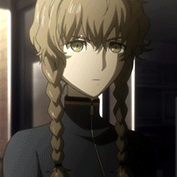
She has my favourite story in the series. She is an example of why I think Time Travel can be enriching when it comes to characters and relationships, if well used. She is basically a child soldier from a bad future and seeing her enjoy herself in a peaceful time is delightful. At the same time, I love how she ends up being so important for different people in many different ways because of her time travels. She ends up being both daughter and friends, big sister and little sister, mentor and disciple of the same characters. She manages to experience many different relationships with the same people and this ends up making her story and her character beautiful. At the same time sad and hopeful.
2) Fragile (Death Stranding)
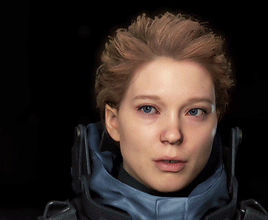
I have talked about her here. Fragile embodies one of the thematic hearts of Death Stranding imo. She embodies the beauty of humanity. A humanity who is fragile, but not that fragile. It is a humanity that specifically because it is frail is beautiful and must be protected. It is a humanity that wishes to reconnect and to build something new. A humanity who is frail, but not weak.
3) Yosano Akiko (BSD)
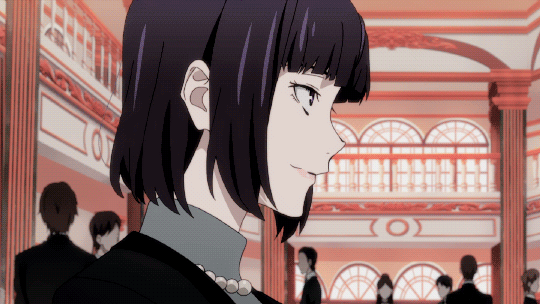
Yosano (together with Chuuya) has one of my favourite backgrounds in the whole series. Her background is great because it explores how a healing power can be used in a disastrous and utilitaristic way. It is also a story that highlights the strong link between death and life and how death is a part of life and also something that in specific situation gives value to life itself. In short, her story and character are incredibly complex and deep.
4) Mikasa Ackerman (Snk)
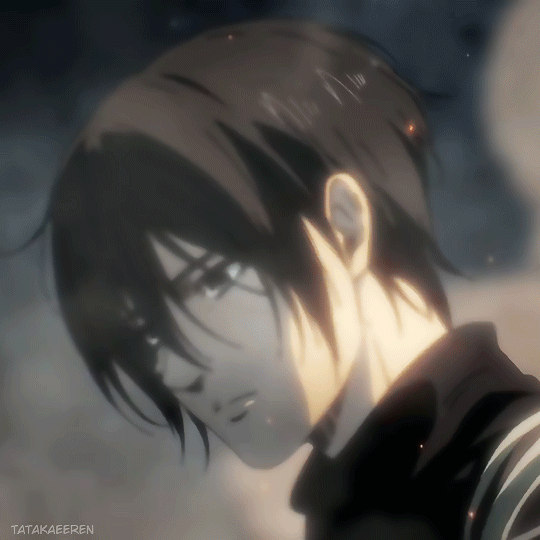
I have written about her multiple times. In particular, this is why I love her. Mikasa is for me an incredible refreshing character and her story and character moments are all all very beautiful and delicate, but also powerful.
5) Gabi Braun (Snk)

I like children characters that are also complex. Gabi is like this. She is a kid, but has a very well defined personality and you can clearly see why she is how she is at the beginning of the story. However, she is also challenged and is able to grow and to bloom. I like what her arc represents and her relationship with Falco is very cute. I also like that she is able to be useful in fights despite being a child and not having superpowers. Her ability are well fleshed out since the beginning and they remain as a constant throughout her story.
6) Emerald and Mercury (Rwby)
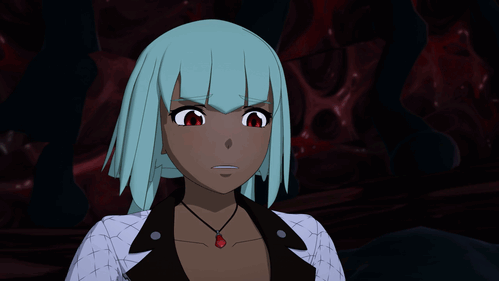
I adore them. They are the reason why I am currently so passionate about Rwby tbh.
They clearly represent two different sides of Cinder and are linked to the root of who she deep down is. Moreover, they are two very complex characters on their own rights and have opposite strengths and weaknesses.
Emerald is a child hungry for love who would even accept wasted food to try and fill that hole she has inside of her. She steals from others to feel whole, but she is never able to truly get what she wants.
So, she traps both others and herself inside complex illusions and refuses to use her (very powerful) gifts for others. Despite this, it is clear that she has an incredibly high potential to care... she fights her feelings, but they are very slowly resurfacing. She is a gemstone covered in dirt (I am the one, who rose out of filth and was loved by no-one) and her outfit clearly conveys this as well.
Mercury is a child who has been hurt so badly he thinks he can’t be anything else, but what his abuser told him he is. He killed his father, but is still very clearly stuck in a cycle he can’t escape and that will repeat itself forever, if he does not manage to change. Before there was his father, then Cinder and now Tyrian.
He very clearly lashes out at others because he feels he is less than them in a way (he has no semblance, he has lost a part of himself). However, it is clear he has within himself still the ability to care. He very obviously cares about Emerald and tries to protect her in a misguided way. His attempt to help her are honestly just heart-breaking. He wants her to be safe, but has no idea of what a safe environment is.
In short, Emerald and Mercury are very clearly two abused children, who react to their abuse in different ways. Mercury’s sense of self is so fragile he just kills it and tries to fit where he is, while Emerald develops her semblance aka that part of her she uses to hide her true self behind.
8) Allison Hargreeves (The Umbrella Academy)
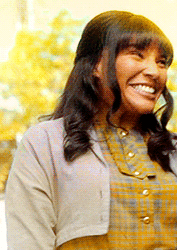
I love Allison’s powers and arc in both the series and the comics. I would love to write a meta about her eventually :’’’) Probably when TUA comes back and I feel motivated again. Anyway, I love that in the show her story is basically about her finding her authentic voice. She has lived a life made of lies and now she is trying to discover who she truly is and has trouble accepting her powers as a part of herself. Who is she without them? When should she use them? How? And won’t she disappear behind them if she uses them? How can she be herself with her powers? And how can she be herself wthout them?
What is true and what is not?
Allison’s arc is basically a very nuanced answer to this complicated question.
9) Five Hargreeves (The Umbrella Academy)
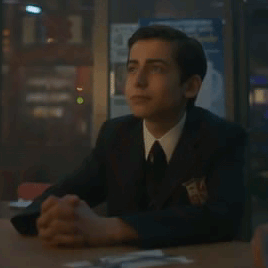
Five is my favourite character of the series. I love him very very much. He is a tragic character because he is so active, but his actions end up creating more problems than solutions. To avoid the apocalypse he should simply spend time with his siblings and care for them as people, who he does, but often fails to convey to them. I also like how in both seasons his power are fundamental for the plot and are used in the finale to solve the conflict.
He spends the majority of season 1 doing everything alone and ends it, by choosing to bring his siblings with him.
Season 2 happens because Five aims too high (a mirror of how he always values the bigger picture instead than the small meaningful moments with his family). This is why in the finale he travels back of only some seconds, just enough to prevent the deaths of his loved ones.
10) Levi Ackerman (Snk)

I love that Levi is such an important character both in terms of plot and in terms of themes. I think the Serum Bowl is one of the hearts of Shinjeki no Kyojin and one of the moments where the theme of freedom and choice is explored in its more nuanced way.
11) Krel Tarron (Tales of Arcadia)
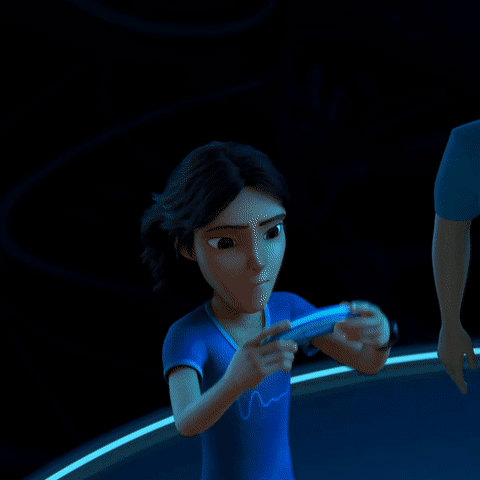
I love Krel’s development. It is subtle, but it is very effective. Krell deep down wants companionship, but uses his own bias to put distance between him and others, so that he can’t be refused. Seeing him defrosting and becoming warmer because of his friendship with others is great! And I love his dynamic with Aja and how the two sibling are complementary and grow in opposite directions. I really like their arcs and their complementarity.
BONUS: Cinder Fall (Rwby) and Viren (Tdp)

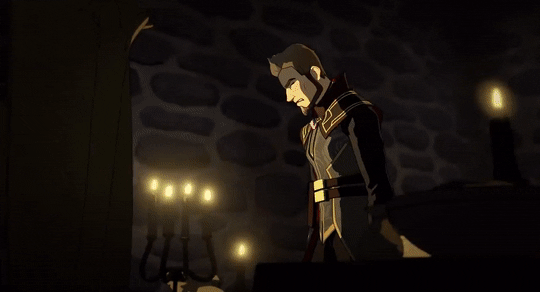
They are bonus characters because they are not faves on an emotional level. However, I really like how they are written and that they both form a complex trio of foiling with two kids characters (and the kids characters are in both cases faves).
They are both two complex villains with complicated motivations that tie in their own self identities. They are also very clearly not the final villains of the series, but are still pretty much at the centre of the conflict of their respective stories.
Thank you very much for the ask!
#chain of faves#asksfullofsugar#thanad-zid#suzuha amane#fragile#yosano akiko#mikasa ackerman#gabi braun#levi ackerman#allison hargreeves#five hargreeves#emerald sustrai#mercury black#krel tarron#cinder fall#lord viren#steins;gate#bsd#death stranding#the dragon prince#rwby#snk#tua#tales of arcadia
19 notes
·
View notes
Note
I agree with everything except the last sentence. I know it's trendy lately, but we really don't need to mix racism with everything. For me, a POC girl, this is as ridiculous as saying that liking top! Joe is racist. I am glad that people have become more aware of certain things, but you cannot exaggerate it and see racism EVERYWHERE. Even where it is not the case.
re: this post
Well, thanks for sending in an ask. There's kind of a lot of parts to this I want to address, but first let me ask - do you disagree with my assessment that Joe gets more blame for the exile and exile length, or do you disagree with my assessment that Joe getting that blame comes from a pattern of fandom racism? Because the first is a fandom interpretation and as always, interpretations will vary and be heavily based on the fandom circles you are in; it's based on a pattern I noticed in my engagement with fandom, the same way I noticed fandom's treatment around Booker's exile, and I find the two intricately linked. Some people (like possibly you) may not connect fandom's prioritization of Booker's pain/trauma to be implicitly (or explicitly) against Joe specifically, rather than against the group of Andy, Nicky, and Joe. [Regarding not naming Nile, the fact that she is a) new and b) voted for the apology-only means she seems to rarely get conflated into the blame game.] Like, ymmv, etc etc.
However, if you do think Joe gets specifically and repeatedly put on a different level from the other two in terms of being the one to heavily push for a long exile (against group opinion), being the one who wanted the strictest "punishment" possible because he's the angry/resentful/unforgiving one, being the only one who wanted the "punishment", being emotional (irrational) in his hurt while the other two are calm and collected (and therefore rational/objective in their decision), that his reaction is going to be a continued vocalization of his anger only and/or that his vocalization is a problem but Andy's immediate reaction or Nicky's silent treatment isn't, that his reaction is only anger while Nicky and Andy are disappointed/hurt/guilty/etc (aka a spectrum of emotions and not just one note), that his main motivation is retribution (esp that the other two don't feel that), that his anger is based on and only on selfish hurt (for hurting Nicky) while the others are looking at the larger picture of Booker's actions or able to see Booker's side of it, that he is quick to temper (unlike the others) and can't control his response, and/or that in general his anger about the betrayal isn't justified, I don't quite get why you wouldn't assume racial bias has a role in it.
Like, Joe is a different character from them! He's considered the emotional one, the expressive one, the vocal and loud one (to varying degrees of fairness.) The genesis of those traits exists in canon, and fandom as always has the weird ability to both flatten a character to specific traits and layer on complexity to the shown facets of character's canon. I even get why he gets tagged as the most mad in comparison to the others (though I don't actually agree with it) - the way Andy had her angry moment with Booker but doesn't continue with that anger in the lab and she's caring with Booker in her goodbye, Nicky basically tells Joe now is not the time to yell at Booker and then you never see him interact (look at?) Booker again, and again Nile wanted to let him off with an apology. I'm not saying it doesn't make sense or comes completely out of left field to view it that way.
But again, it's not that he reacts differently; they're all different people and obviously their reactions will reflect their personalities and their relationship to Booker. It's that his reaction to betrayal is held to a different standard, the way he's subtly and consistently painted as wrong for his reaction in a way the other two aren't. And to be clear, I am specifically and only talking about the dynamic around Booker's exile and Joe, and not how Joe in general is written, but there's some touches of it in that too. My comment is also very much not about one specific fic or one individual's opinion about either Joe or the exile, but about the pattern I noticed that Joe's reaction is often treated with a different (lesser) level of acceptance than Nicky's/Andy's, that his reaction is often assigned more/only negative motivations (esp in comparison), and that (which ties to the main point of my first post) his reaction (even if - though it’s not - just anger) should be de-prioritized in comparison to Booker (or the others.)
And obviously, this isn't all fic. Maybe not the majority of fic. But it's definitely more than one; it's something I started to pick up on as a potential thing to look for, and I know I'm not the only one. This is a large fandom and it is growing. This fandom on A03 alone has almost 6k works, and that's been in six months. (And that's just one platform!) It is frankly preposterous to me to say this one (large) fandom is somehow the only fandom where racial bias isn't a factor, or that it doesn't affect how all the characters get written.
(also I think it's worth bringing up while my original post, this ask, and this response have been heavily leaning on words about fandom's racism, I don't think that's divorced from its Islamophobia and the western (US/Hollywood) racialization of Muslims.)
As for the general fandom and racism discussion - look, I'm not going to speak over you a poc and say you should or have to notice racism in everything. It is 100% not my place to tell you how to experience/react to racism, how to interact with fandom and racism, or to say you are doing it wrong.
I'm personally coming from a different mindset - that racism does affect everything, and that fandom is absolutely not different in that regard, and that reactions to racism (either for people of color in general or the specific identity being talked about) are not monolithic.
I also think - while I get why you use it - the word 'trendy' does a disservice to fandom racism discussions and how those got co-opted and conflated in the larger cancel/call out culture. Cause
racism being used as an excuse/reason to cancel something ("I hate this, and here's racism as a reason no one should like it/why you are a bad person for liking it")
racism being discussed as an important issue canon failed at ("I'm criticizing the canon and depending on what it is, I may think canon's racism should hold the highest priority in terms of canon's worth")
racism being looked at through the lens of fandom ("racism permeates every facet of this world and that includes canon/fandom, here's how")
are all different things, and while the first one is used a lot more, and all of them are a lot more visible now, I don't think the other two are that much more accepted than they were before.
I only caught the periphery bones of the top/bottom joe/nicky controversy, but my understanding is these two sides collided very badly: side a) early into fandom people pointed out the trend, related it to how that trend works in every other fandom, discussed specifically how bias in interracial and interfaith relationships are likely to show up in this fandom and that dynamic, called for more nuance/thought into this dynamic, and all of that got flattened into "top!Joe is and only is racist, and you're a racist for liking it." and side b) because call out/cancel/purity culture, fans (specifically including fans of color) were being called racist for either engaging in the characters the "wrong way" or not engaging at all, pushing them to create content they didn't want to create, left the fandom due to harassment/bullying, and got treated like even the hint of top!Joe was the Worst Thing They Could Ever Do, so that even suggesting racial bias may play a part on shipping dynamics for joe/nicky is completely unreasonable/without merit. That, again, is how my (limited) view followed the issue, and like everyone else where I fall on the spectrum of that discussion is very much dependent on the circles of fandom I float in.
#like whether it's coming under Angry Brown Man™#or as a Muslim character#(like the Riz test for Muslim characters where one of the test questions is 'is he treated as irrationally angry?')#or as a MENA character#I do think Joe's reaction is treated to a different standard than the others#and that that difference comes from a (probably unconscious non-malicious) racial bias#hell as I was writing this I realized a fic I absolutely adore (like my favorite Booker take down fic)#has some shades of this#where's that you're not immune.gif#//#fandom repeat fight#cross the street#can't believe you have to come back to an ask to add tags wtf tumblr#can't believe you can't save drafts to check them over wtf tumblr#a and a
10 notes
·
View notes
Quote
My thoughts on what it means to be a gifted adult . . . and how it might help you. Imbued with a finely tuned and advanced perceptual system, the gifted adult processes information-of-all-kinds with a voracious appetite, and stunning capacity. Typically, we associate giftedness in adults with high levels of achievement. But, like many things… It’s not that simple. “In fact, the gifted person is as likely to be the high school rebel as she is the valedictorian, the CEO, or the Nobel prize winner (Jacobsen, 1999).” And whether we are prize winning leaders, are unseen or rebellious, are living on life’s grandest stage, or thriving behind-the-scenes, we share a common psychology. In fact, our psychology — our mental characteristics and aptitudes — is often misconstrued, and is certainly tangled in misinformation. We share a psychology that begs for aeration. . . . GIFTED. It’s a loaded term, and, perhaps, a unfortunate moniker to describe this many-peopled and diverse group. Read the descriptive phrases below . . . Sit back . . . see if they fit . . . then decide if this paradigm might shed some light for you . . . . . . GIFTED ADULTS, WHO ARE . . . Brilliant. Bright-eyed, shining-like-the-sun brilliant. Capable of often instantaneous and complex pattern making. Possessed of uncommon and extraordinary talent, in any number of areas. Talents may only be strongly evident in one area, or none; it will depend . . . Conversely, may possess (and have activated) many areas of talent. It’s tricky. The activation of innate potential depends: on deep interests, on chance, on available resources, on personal history, on cuing and miscuing variables (in our families, especially in education, and, more broadly, in society), on opportunities, and on recognition. We can be missed. We can be so deeply out-of-step with our own potential (and deep interests) that we are truly missing-in-action, even to ourselves . . . (more on that later . . . stay tuned . . .) Profoundly curious — delightfully, expectantly, deliciously, assiduously curious . . . Unyielding in our pursuit of knowledge, and of truth. Open to experience. (Assuming that we have not been squelched in life. And that is a big IF — very unfortunately — for many different reasons. . . ) At our best, we can be observed leaning into novelty with expectancy and verve, although not always with grace, (sometimes a little clumsily in fact). But, we are compelled to learn. We have a “rage to master”. (Winner) We are hungry for novelty, and the heady feelings associated with learning deeply and widely. It is life-giving. Soul food. Can integrate diverse elements, relationships, or values, with ease, and delight in doing so. It is play for us. Capable of broad and nuanced associative learning. Can link ideas that reinforce each other, in seemingly endless loops of understanding. While highly stimulating and deeply affirming it can also be exhausting . . . an untameable creature. . . . Gifted adults are coherence seeking. Coherence is really, really important to the gifted adult. Things need to connect, to be internally consistent. Patterns need to make sense. For the gifted adult, one learned pattern inevitably points to or suggests another pattern, a more complex entity. Terence McKenna expresses this dynamic of emergence, common to the gifted adult experience: “I see the cosmos as a kind of novelty-producing engine, a kind of machine that produces complexity in all realms — physical, chemical, social — and then uses that achieved level of complexity as a platform for further complexity.” . . . Analytical (although not always), intuitive (most often powerfully so), with extraordinary cognitive processing capacities. Possessed of a storehouse of complex and dynamic emotions which may, or may not, be in play. We know that emotions need an appreciative audience to develop in healthy ways, to be able to live-out-loud. And the gifted adult needs an arena to play in. This storehouse, and these emotions, are very, very powerful stuff (more on this later, too). . . . Imbued with strong sensual appetites. Richly imaginative. Wildly, soul-affirmingly wedded to an inner life that feeds them. An inner life of imagination, of possibilities; rife with images; suggestive of a life-yet-to-be . . . a world-that-could-be . . . IDEAS THAT WILL NOT DIE: concepts that are wiggling-into-existence, or slamming themselves with authority into our consciousness, seemingly out of nowhere. I want my inner truth to be the plumb line for the choices I make about my life -about the work that I do and how I do it, about the relationships I enter into and how I conduct them.” Parker Palmer Passionate, intense (very intense), and sensitive, sometimes inhumanly so. Most gifted adults are endowed with something psychologists label “High Developmental Potential” which includes intense and nuanced responses to even seemingly neutral stimuli, an autonomous nature (think strong will), and very high intelligence. Throughout our lives . . . We will be compelled to explore and live out something deep within our core, not-to-be-ignored, entirely unique to each of us. Among his various possible beings each man always finds one which is his genuine and authentic being. The voice which calls him to that authentic being is what we call “vocation.” But the majority of men devote themselves to silencing that voice of the vocation and refusing to hear it. They manage to make a noise within themselves…to distract their own attention in order not to hear it; and they defraud themselves by substituting for their genuine selves a false course of life.” (Jose Ortega Y Gasset) . . . We are drawn to the integration of diverse elements, relationships, or values and exceedingly adept at that integration. This integration may take many forms: aesthetic, scientific, through language, using logic or mathematics, using an emotional lens, through movement, music or dance. . . . “Sooner or later something seems to call us onto a particular path. You may remember this “something” as a signal moment in childhood when an urge out of nowhere, a fascination, a peculiar turn of events struck like an annunciation: This is what I must do, this is what I’ve got to have. This is who I am.” The Soul’s Code: In Search of Character and Calling, James Hillman . . . EVERY DAY: SEEK A LITTLE MYSTERY In the end, the motivating force that spurs and galvanizes a brilliant man or woman is expressed by Albert Einstein: “The important thing is not to stop questioning. Curiosity has its own reason for existence. One cannot help but be in awe when he contemplates the mysteries of eternity, of life, of the marvelous structure of reality. It is enough if one tries merely to comprehend a little of this mystery each day. “Old Man’s Advice to Youth: ‘Never Lose a Holy Curiosity.’” LIFE Magazine (2 May 1955) p. 64” Albert Einstein
P. Susan Jackson, Author
11 notes
·
View notes
Note
Hi! So, I’ve just recently gotten into K-Dramas, and... I have a small issue, and that is though I LOVE them in the beginning, by the end they always disappoint me? Like, they start lighthearted and fun, and then by the end suddenly everyone’s in mortal peril, and I don’t care? Or they start all fantasy, and then it’s all about the romance in the end? So... Could you possibly recommend me ones that are good, or tone consistent, throughout? Please?
Hi! Thanks for dropping by for recs. These are some of my favorite asks. I just love going back through my watch list and finding dramas that fit a given criteria. It gets more fun the more dramas I've seen.
The thing about Kdramas that makes them a uniquely sticky beast is that many of them are live-shot week to week, at least for part of their run, and often the scripts are not fully written before filming begins. Popular Kdramas will also occasionally receive extensions which can cause further pacing and plot issues and (sometimes) cause a story to sputter out entirely. With the increasing prevalence of entirely preproduced dramas there's been an increase in overall drama quality and consistency in past years. That being said, Kdramas are still a decidedly mixed bag in terms of overall production quality. So it pays to either drop things with extreme prejudice if you stop enjoying them and watch widely, or to have a good drama filter friend (like me!) to give you vetted recs. As a genre a lot of the more "classic" feeling dramas have a tendency to start really light hearted and then swing super dramatic in the latter half. That's something I occasionally like, but lucky for you not all dramas are like that!
Your ask doesn't really tell me what genre of Kdrama most appeals to you, so I went through my list and tried to find you wide a variety of dramas that I think of as being well-paced and tonally consistent throughout. I've also tried to limit myself to dramas that I rated highly on MDL, although my primary criteria was "good and tonally consistent" so this list of dramas is kinda all over the map. But then, so are my tastes. Also, I kinda got the impression from your ask that you're not a fan of the uber-melodramatic side of kdramas and you want something a little more restrained and less soapy, so I tried to steer away from those more makjang dramas but did not entirely succeed, lol. I gave a couple sentences of description so you can more readily narrow down what you're interested in, and if you would like a more thorough review of the dramas some of these have full reviews on my blog which I went ahead linked where they exist.
Age of Youth: A well written slice-of-life ensemble drama about a group of 5 college age women who end up boarding together. There are a couple moments of high drama/trauma toward the end of the show that might be a turn off. But other than the finale the tone is consistent. 9/10
Arang and the Magistrate: A dark fantasy fusion sageuk with a romance. I included this drama because it does a good job of developing the creepy worldbuilding and fantasy throughout. Though at points it can be a bit slow and the special effects are hella cheesy. 8/10
Argon: A tight, journalism driven suspense drama. Not always my genre but I found it very engaging, and at eight episodes it does not overstay its welcome. 8/10
Be Melodramatic: Another female-centric slice-of-life ensemble drama, though with an emphasis on fourth wall breaking comedy and clever dialogue. Very funny and heartfelt. 8.5/10
Cheese in the Trap: Maybe a controversial inclusion, but I very much enjoyed this drama. A slice-of-life college romance with psychological thriller elements. Some critics felt that the drama focused too heavily on the second male lead in the later half of the story, but YMMV. 8.5/10
Coffee Prince: Classic cross-dressing romance and still probably the best of its kind. A wonderfully nuanced and progressive handling of the subject matter, even after 13 years. Deals with serious subjects but doesn't go too melo with it. 8.5/10
Children of Nobody: My best of 2019, a dark psychological thriller about a child psychiatrist and a police detective who have to confront gray morality while attempting to track down a serial killer who only targets unrepentant child abusers. 9.5/10
Ex-Girlfriend Club: On the lighter side, a friends-to-lovers type romantic comedy about the writer of an autobiographical webtoon who has to figure out a way to get along with a group of his ex-girlfriends to make a movie based on his work. Only 12 episodes. 8.5/10
Go Back Couple: Also only 12 episodes (these shorter dramas tend to be better paced I find) a time-slip drama about a divorced couple who get the chance to relive their twenties and end up realizing they still have feelings for each other. This drama is both very funny and it had me bawling on multiple occasions. 9.5/10
Healer: A favorite of a lot of drama fans, this is an action-focused romance about an awkward soft boy with a secret identity as a highly skilled errand boy to criminals and an intrepid tabloid reporter who is his biggest fan. This drama is pretty tropey, but it's fun and the romance is great. 8.5/10
Hello Monster (aka I Remember You): A police procedural with a background love line about a criminal profiler looking for his lost brother and a detective looking for her father's murderer. One of my personal favorites. 10/10
Hit the Top (aka The Best Hit): A time-slip fish-out-of-water comedy about a 90s pop star who winds up in modern day Seoul and ends up befriending his biological son and meets old friends who his disappearance left in the lurch. 9/10
Incomplete Life (aka Misaeng): A realistic office drama that gave me real world work anxiety, focusing on a failed Go player who winds up an intern at a highly competitive shipping company and has to find a way to earn his keep even without the background and college education of his coworkers. Unbelievably well done ensemble drama. 9/10
Just Between Lovers: A romantic melodrama about two people whose lives were irrevocably changed by a tragic mall collapse that nearly killed them as children, meeting again as adults and finding comfort and healing in each other. A rough sit at times, but a wonderful love story with incredible acting. 9/10
Just Dance: High school, slice-of-life, drama about a dance club in a technical high school and a group of working class kids who reluctantly become involved in this club and befriend each other. Only 8 episodes (or 16 thirty minute episodes, depending on how you recon it.) 8.5/10
Life on Mars: Remake of the British show of the same name, this is a surreal time-slip police drama, about a forensics expert who gets shot in the head and wakes up in 1988. Or does he? He could also be dying on an operating table. It's hard to tell. Dark, suspenseful and trippy. 9/10
Matrimonial Chaos: An off-beat comedy about two dysfunctional couples who become inescapably mixed up in each others lives. One that's having a hard time getting divorced and another that's having a hard time getting married, and all the messy weird emotions that go along with that. This is another one of those, makes you laugh/makes you cry throughout dramas I have an affinity for. 9/10
Moment of Eighteen: A heartfelt high school drama about a straightforward but awkward loner who is forced to transfer to a new school, immediately earns the ire of a powerful student and experiences first love. Not my usual thing, but very well written with complex and likeable characters. 8/10
Mother: A cold and socially isolated woman becomes a temporary teacher and upon discovering one of her students is being severely abused and neglected, decides to pose as the child's mother and go on the run with her. Like Children of Nobody, this can be a bit of a rough watch because of the subject matter but it is very well done. 9.5/10
My Mister: A healing, human drama about a structural engineer in his 40s and a debt-ridden young woman in her 20s who end up crossing paths and saving each other from a miserable existence. My current all time favorite drama. Cannot say enough good things about it. Practically perfect in every way. 10/10
One Spring Night: A very restrained and naturalistic slow-burn romance about a woman who is about to get married and suddenly begins to question her relationship and a single father who had given up on love who find themselves irresistibly drawn to one another. 9/10
Prison Playbook: An ensemble slice-of-life drama centered on prisoners and correctional officers in their day to day lives. I find the actual het romances in this drama totally useless, but it's a large and talented cast playing a variety of lovable characters. 8/10
Psychopath Diary: Recent fave. A screwball black comedy about a mild mannered pushover who loses his memory and finds a diary that convinces him he's a psychopathic murderer, which gives him a huge boost of confidence from his new found identity, much to the chagrin of those around him and the actual owner of the diary himself. 8.5/10
Queen In Hyun's Man: A drama about a Joseon scholar who time travels to modern day Seoul and meets an actress who just landed a part playing the queen he served in the past. This one might be on the border line of too dramatic or tonally inconsistent, but it's got one of the most pitch perfect finales in Kdramas and the 45 min episodes keep it a snappy watch that doesn't drag or meander too much. 8/10
Reply 1988: A late 80s nostalgia drama about a group of families who all live off the same alley. Lovely family drama, comedy with a variety of romances. Long ass episodes especially later in the run, but I have rewatched the whole thing and I loved every minute of this show. 9.5/10
Save Me: A dark drama about a young woman who finds herself forced into a dangerous cult by her family, and is desperate to escape, and a group of 4 local young men who try to help her. One of the more unique and well done OCN thrillers. 9/10
School 2013: High school ensemble drama that launched a whole bunch of careers. In general I avoid school dramas (I know there have been three on this list so far, but those are like the only three, lol) but this show got me so invested in all these students and teachers. Also the two male leads are so shippable. 9.5/10
Secret Love Affair: A romantic melodrama about a piano prodigy from an underprivileged background who catches the eye of a married older woman and the two fall into a passionate affair. This drama involves cheating (obviously) but it's beautifully filmed and written and the music is to die for. 9.5/10
Signal: This is a supernatural crime thriller and a perennial favorite in the Kdrama community. An imbittered criminal profiler finds an antique police radio which allows him to speak with a police detective 15 years in the past, and uses this to crack cold cases and try to prevent brutal crimes from ever happening. 9/10
Six Flying Dragons: This one is a bit different from the others on the list, first of all because it's a more traditional historical drama, and secondly because it 50 episodes long. But it is so, so very good. And if you're looking for overall consistency in terms of storytelling and tone this drama has it in spades. 9/10
SKY Castle: A unique melodrama about a group of affluent competitive mothers who will go to any lengths to get they're children into the best medical schools, and a mysterious school coordinator with shady motives who gets brought in as a ringer to give them an edge. This show is kind of hard to sell but very entertaining and watchable. 7.5/10
Stranger (aka Secret Forest): The story of a stalwart prosecutor who, due to a childhood trauma is unable to feel the full spectrum of emotions, works with a bighearted police detective to root out corruption around a series of murders. This one’s rather cerebral and requires your full attention but the leads are amazing and there's a second season coming out this year I'm very much looking forward to! 9/10
The Nokdu Flower: Another sageuk drama about the latter years of the Joseon Dynasty surrounding three people who fall on different sides during the Donghak Peasant rebellion. Incredibly well written and involving historical drama. If you're not sure you're ready to commit to something like Six Flying Dragons, I think this would be another good entry point into the genre. The acting is amazing. 9/10
The Smile Has Left Your Eyes: A romantic melodrama and psychological thriller about a dangerous enigmatic young man on the cusp of becoming either a human being or a monster. He becomes involved in a fraught relationship with the sister of a police detective at the same time her protective older brother begins to focus on him as the prime suspect for a murder. High key moody and tragic if you're into that kind of thing (I am). 9/10
Touch Your Heart: On the complete other end of the drama spectrum, this show is pure unadulterated fluff, which managed to keep me giggling and swooning throughout the run, even though it's typically not my thing. An actress joins a law office as research for a role and falls for the ace attorney she's assisting. 8.5/10
WATCHER: Another OCN thriller about three different people with shady motivations who are connected to the same murder case and become involve in a corruption task force looking into dirty cops. One of those "trust nobody, everyone's a suspect" dramas with lovely complex characters and a fully engaging plot. 8.5/10
Sorry that got so out of hand! This is what happens when you don't give me a little more direction I guess. These are all dramas I quite enjoyed and I believe you will find something in there that will suit your fancy. This is a pretty accurate cross section of my tastes.
Happy watching!
Jona
#asks#answered#kdrama recs#this got stupid long#i got half way through writing my two sentence plugs and was like#omg why did i put so many dramas on this list#lemme just casually throw together a list of 30+ titles that’s what you want right#like wtf#oh well#hope you find something you like anon#i have no idea why i’m this way either
77 notes
·
View notes
Note
SU or P&F for the media hyperfixation ask! Choose your favorite questions. I can’t decide which to pick.
Okay, will answer whatever I feel like (or rather, what’s easy enough, if anyone wants to challenge me then be more direct :P).
Steven Universe:
📌 how did you find your hyperfixation? Like many, I found out about SU because of tumblr and everyone getting excited over Jailbreak when that aired. I didn’t bother watching the show for a while, but the fact I kept hearing so many good things about it ended up with me having to consider it eventually. I finally gave it a shot about six months or so later, and I instantly fell in love with it.
✨ what draws you towards your hyperfixation? what is interesting about it? For me, I think really the core of what draws me to SU is that I don’t think I’ve come across any story this emotionally intelligent? Like, people will always talk about complex characters and moral ambiguity, but SU is probably the story I’ve seen do it best. The writers have outright said they don’t categorise characters into good or evil and just focus on who they are. This ends up with a cast where pretty much even the most minor characters can have nuances and feel fleshed out, and the characters all end up with so many interesting relationships. I’d also say the fact that even with this complexity, the fact that the show always aims for a positive outcome is especially commendable. I like angsty and dark stuff myself, but when you make sure it stays hopeful and try to send positive messages through it, it ends up making something really touching.
🏳🌈 do you have any headcanons (lgbt, race, neuro, etc) that are important to you? Nothing too strong, but I do find myself as an Autistic person with strong connections and relatability to characters like Peridot, Pearl and Onion. I also think Steven is neurodivergent in some way, though I’m not specific on what. I’m also of the opinion that gems are technically asexual because their species has no reason to have sexual attraction. They clearly have romantic relationships as seen… all the time, but in terms of sexual orientation there’s no reason for it to be in their species because that’s now how they produce. They can still have sex and enjoy it (as implied with characters like Rose), but they don’t feel attracted to others in that way because there’s no need to. I list it here mainly because I think it’s important to remember that Gems are still aliens and probably don’t fit into human behaviours as neatly as some may assume? I mean, it’s pretty much canon that they’re technically agender nonbinary women, because despite gems not having a concept of gender as a species, they’re fine with being perceived as women even if they don’t fit human gender binaries (Rebecca Sugar even said it’s to reflect on her experience as a nonbinary woman, someone who’s okay with being perceived as a woman but doesn’t actually fit the gender binary).
🍀 do you have any kins or comfort characters from your hyperfixation? I’m not a kinner by any means, but I definitely have comfort characters. Peridot and Connie are probably my main ones, I just strongly empathise and connect with those kinds of characters (young passionate nerds :v). I think for Peridot it’s also the anxiety and just attitude and quirkiness, and for Connie it’s her background (something that really helped me) and how relationships work for her.
Phineas and Ferb (forgive me if I’m rusty here, PnF hasn’t been in the central special interest spot for a while so I’ll have to work with what I can):
📌 how did you find your hyperfixation? I believe I first spotted Phineas and Ferb on an advertisement in a kids magazine they sell in Australia called DMAG when I was 11. It stood out to me, but not enough for me to independently investigate (I mean I didn’t have Disney Channel so I couldn’t just watch it whenever I wanted). It then showed up on free to air TV eventually, and even then I found it much more interesting than all the other shows on TV.
✨ what draws you towards your hyperfixation? what is interesting about it? I guess if I had to summarise it, it would boil down to what the show kind of promotes: creativity. Phineas and Ferb is a really creative show, and that was part of its original appeal to me, I had never seen anything so intelligent or complex from a kids show at that time. Going even deeper, I just really like the characters. I think they’re really interesting is that at first they might seem one dimensional or like stereotypes, but there’s often more going on, with the show often outright deconstructing the roles the characters have boxed themselves into. Couple that with the fact that even in a comedy focused show nobody is mean each other for the sake of it, and you have a really loveable cast.
🏳🌈 do you have any headcanons (lgbt, race, neuro, etc) that are important to you? Many headcanons. For important stuff, you’ll most likely see me on the ship of the Autistic Phineas as well as OCD Candace headcanons, but I also think Autistic headcanons can work for all the Flynn-Fletcher kids, Baljeet and maybe even Doofenshmirtz (who I also think fits ADHD, and honestly given how similar ADHD and Autism are comorbid I see how that neurotype can apply to characters like Phineas too). I also have thoughts on all the characters’ sexualities, but one I find myself gravitating towards a lot is asexual or demisexual demiromantic Phineas, given that falling for people doesn’t seem very easy to him? I also think Isabella is some flavour of demi because it’s clearly hard for her to have feelings for someone not Phineas. Also, count me in on the trans Doofenshmirtz train.
🍀 do you have any kins or comfort characters from your hyperfixation? Phineas is actually one comfort character, believe it or not. I’m not really like him, but he’s sort of the kind of person I aspired to be? And I think it’s also the fact that despite his optimism and genius that he still has human flaws and struggles interacting with certain people (aka fodder for Autistic headcanon lol). I find myself relating to that flawed side even if most people either don’t focus on it or just treat it for lolz. I also find Isabella is one too? I guess as I grew up I ended up realising I was more emotional and sentimental than I thought I was, so I kind of really empathised with her and her struggles with her crush on Phineas. Depending on my mood, Baljeet, Candace and even Stacy can also be comfort characters with their unique issues they face (especially Baljeet, who is probably who I’m most like lol).
9 notes
·
View notes
Text
Hold Me By the Heart: A Peek Into the Story
Hold Me By the Heart by: muchadoloo
Description:
It was Cara who unwittingly laid it out for him.
“You hand the kid off a lot.”
The comment didn’t seem antagonistic, just thoughtful. Something about him must have screamed confusion because Cara, ever-so-observant, continued.
“Like I said, it could be a loose lead…I didn’t think it mattered at the time, just an observation. But it must be a lot on the kid, not knowing who wants him or where he belongs.” She shrugged and sipped her canteen. “Don’t get me wrong, I get it. That kid’s got a bounty over his head. Someone’s gotta protect the little guy. You can’t just stay in one place. Hell, you can barely hold him for long. I just figured the constant movement… Must be a lot.”
Din felt like someone had doused him in cold water.
———–
Or, the story where the child has separation anxiety and, go figure, refuses to be separated from Din.
Inside the Story: An Extensive Analysis
The Beginning
I started writing Hold Me By the Heart after finishing the Disney+ series. Though I absolutely adored the show, the characters, and the cinematography work, I kept questioning the developmental psychology and realism regarding Din’s relationship to the child. The more I watched the show, the more I noticed how often Din left the kid on the ship, asked a random bartender to watch him (only for the kid to wander outside with his bone broth in chapter four), gave him to other people, and rarely held the kid for a long period of time. Though I understood Din’s choices (e.g. as a bounty-hunter and Mandalorian tasked with protecting the child, there isn’t much time for nurturing), I began to wonder how Din’s way of life, the kid’s past, and both of their developmental stages would/could clash or deepen their characters? Thus, Hold Me By the Heart was born.
The Process of Writing Din Djarin
I rewatched The Mandalorian at least ten times (maybe more?) and I found myself fascinated with Din Djarin as a character. Though there is much about himself that he hides from others, there is even more that Din hides from himself. In particular, his emotional state, desires, and wants. It’s my belief that humans, more often than not, are not just their rational brains or cognitive make-up (thank you, Enlightenment). Though we’d like to think we’re purely rational creatures, I believe we’re, more often than not, directed by our loves and desires. Basically, we all have a chief love or desire that directs our hearts unconsciously. In literary or character-development terms, this is what experts call ‘the motivation’ or ‘the character’s goal.’ In every story, a character has some goal that’s motivating them throughout the storyline. What’s fascinating about Disney+’s The Mandalorian is that Din’s ‘hero’s journey’ is constantly shifting and as such, so are his desires. At first, Din is motivated by base needs (Maslow’s Hierarchy of Needs) such as: food, fuel for the ship, security, etc. Basically, he’s just trying to survive. However, the introduction of the child literally reshapes and changes his desires and motivations. Now, as a side note, Din’s morality is insanely grey and his understanding of ‘what’s right’ in a situation changes based on the situation, rather than a strictly moral code. Thus, Din doesn’t really bat an eyelash when he breaks the Guild Code. Actually, he first begins to diverge from the Code when he asks the Imperial Client, “What are you going to do with it?” He’s never asked that question before — no one does. Thus, this moment shows us how his moral compass is altering, but alas — I digress.
In a story, the main protagonist’s desire is almost tied to their greatest fear. For instance, Din clearly loves the child and is attached to him (desire), but he’s also terrified of what he’s feeling. He doesn’t know how to be a father or be attached to anyone. Moreover, before the child, I doubt Din ever had to examine his emotions or desires closely. However, the child’s distress and separation anxiety trigger’s Din’s own anxiety. Here, is one area where Din isn’t competent: fatherhood. Din can barely take care of himself and now, he’s tasked with caring for a child. Thus, in Hold Me By the Heart, Din vacillates between keeping the kid at a respective distance and nurturing the child. The kid’s presence reminds him of the internal change and revolution Din is going through. In the story, Din’s desire to keep some distance (or, to put it better, not get too attached) has less to do with the child and more to do with Din’s own feelings. It’s easier to push something or someone away than deal with how their presence is changing you as a person.
When I began writing Hold Me By the Heart, I really wanted to capture Din’s character well (I’m sure there’s glaring flaws though). More than anything, though, I wanted to put his chief desires on display — his relationship and growing attachment with the child. As the series shows, Din rarely (and I mean, rarely) explains, names, or even presses into his feelings. Rather, his emotions seem to surprise him often (case study: his sorrow over the droid’s self-sacrifice). Din’s emotional world is not only foreign to him, he’s also unaware of how often his emotions seep out through his actions. Thus, I wanted to capture this behavior in the story. For instance, Din rarely names his love for the child. Rather, other people have to name it for him and it’s almost like an eureka moment for him like, “Oh, so that’s what I’m feeling!” When someone else names it, he never corrects them. Now, just for the record, Din isn’t emotionally incompetent or dumb. He’s just never needed to assess his internal world. He was raised in a strict warrior culture that focuses on strength and physical capability. The internal values (e.g. courage, bravery, honor) of the Mandalorian system is defined by their physical expressions of said values. In other words, they show what they value, rather than spend time assessing it. Moreover, their values are inextricably tied to their role as warriors. A Mandaloran shows that they are courageous through battle. Thus, Din is extremely action-oriented and active. He isn’t a static character, but rather, he’s always on the move.
Thus, I wanted to strike a tension between Din’s Mandalorian upbringing and the demands of parenthood. Because Din operates on Maslow’s lower base needs, he rarely thinks about higher ones such as: self-actualization, emotional health, etc. His context shapes him to focus heavily on survival. So, when the kid is placed in his care, Din focuses on the base needs. He makes sure the child has a comfortable place to sleep; he feeds the kid. He keeps the baby safe. Unfortunately, with the presence of the child’s separation anxiety, Din realizes that the child needs more. The kid demands the full involvement of an engaged physically and emotionally present adult.
The Process of Writing the Child
One of the things I realized about the Disney+ series is how often the series showcases fluff between the child and Din. The fluff is so good and needed, but unfortunately, the show fails to portray the difficult realities of adoption, attachment, and development. In the series, the child is a source of innocence and cuteness in, an otherwise, violent context. Though his innocence is endearing and warrants so many heart-eyes from me, I think the child needs more nuance. The babe can eat frogs and throw a fit when Din attempts to leave. He can suck on the metal ball from the ship and have nightmares. He can be Force-sensitive and still operate as a baby would. In other words, all of us —including the cutest of children— are products of complicated stories and live in complicated narratives. Moreover, adoption isn’t as easy as — “here, I have a working ship and some (constantly depleting) money. I can protect you from danger and, since you’re just a baby, you’ll be happy and grow up healthy.” Rather, adoptees have rich and complicated stories that they lived into (and still live into) prior to their adoption. As a writer and psychology nut, I really want to face these realities head on. In Hold Me By the Heart, the child struggles with separation anxiety, abandonment issues, and object permanence. The presence of the issues are not meant to be some weird fetish of sorts or act as entertainment factors for readers. Rather, the kid’s issues are real, present struggles that impact his development. So I really wanted to contrast the child’s innocence with his trauma and, by doing, articulate that both realities CAN exist in one person.
Moreover, I’ve grown more and more curious about the child’s origin story. Though the babe could have been born into a loving family and was simply taken away (and that’s trauma too), I truly believe the kid has more experiences of being stolen over and over again by random hunters. This reality creates an attachment insecurity, primarily because the child doesn’t know who his consistent guardian is. Moreover, as a baby needing care, he doesn’t know who he can rely on to care for him.
A Brief Word About the Plot
Originally, I’d planned to contain the story to four elongated chapters (like a short story). However, the more I wrote, the more I realized how impossible it is to write about the complexities of separation anxiety and wrap up such a story in four chapters. To do so, for me, would result in a rushed or under-developed storyline. Thus, the story, as of now, keeps expanding.
Moreover, I realized that for Din to grow as a human being and a father, he needed to brush shoulders with other people for more than 10 minutes. As a character, Din is so zeroed-in on his goals, he doesn’t really see people (at least, enough to get an inch-deep into their stories). However, knowing that Din would never stay in one place for long of his own volition, I needed to throw a wrench in his plans. Hence, his injuries and the ship’s damages. Though Din would definitely push through an injury, if his ship were trashed, even he’d recognize he couldn’t go anywhere. Hence, the chapter where he drops into Dantooine (and Maisy’s turnip garden).
Now, before I wrap this up (if you’re still reading, God bless you; you’re a literal saint), one last word about the presence of OCs in the story. Many readers have commented on the nature of the OCs in many fanfics and how, usually, they’re not a welcome addition (same, honey, sameee). Thankfully, a lot of y’all actually seem to like the OCs in Hold Me by the Heart, which is incredible. Here’s my two cents and promise as a writer — I do not believe in filler OCs or OCs that do not enhance the main plot. Period. I honestly believe you can smell a filler OC (or, one that takes the focus away from the main story) from a mile away. In Hold Me by the Heart, I really try to be careful to keep the main thing the main thing, which is Din and the baby’s relationship (I mean, that’s what we’re here for). So, usually when the OCs are in a scene (and, let’s say, the child isn’t present), I try to keep the focus on Din and the kid’s relationship even then. Though Din definitely needs to interact with others to learn more about being a parent, I never want those interactions to take away from the main paring. We’re here for papa Din and baby-bean, so let’s keep them as the focus.
A Note for the Fans
I’ve had the immense privilege of chatting with many of you through AO3 in the comments section, and I cannot stress my thanks enough. You all are, no lie, THE REASON this story has continued. I just had a small idea for a fanfic, but y’all believed in it. Honestly, I’ve only written four chapters (as of now) and y’all have showered the story with kindness and love. Your belief in the story and profuse compliments have meant the world. Please continue commenting and I hope to keep responding. I love interacting with y’all and gleaning from your analyses.
Thanks for all of your support!
XOXO
#ao3#the mandalorian#holdmebytheheart#hold me by the heart#din djarin#baby yoda#the child#fanfic#mandalorian fanfiction#fanfiction#what are these tags#mando#pedro pascal#star wars#mandalorian fanfic
4 notes
·
View notes
Note
Roy Mustang !
Casey you are blessing me with this ask!! I will take any opportunity to gush over my anime husband. (/▽\*)。o○♡
How I feel about this character:
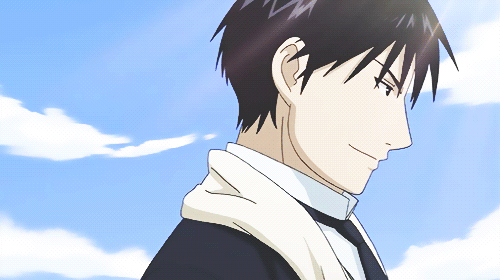
Like Ed, Roy is one of my favorite characters of all time, within and outside the fma universe. In fact, I’d go as far as to put them on equal footing. (I said Ed was my favorite fma character in his ask, but I really can’t choose between them.) While a majority of fma characters are excellently written, Roy is uniquely spectacular in the complexity of his backstory, personality, and relationships with other characters.
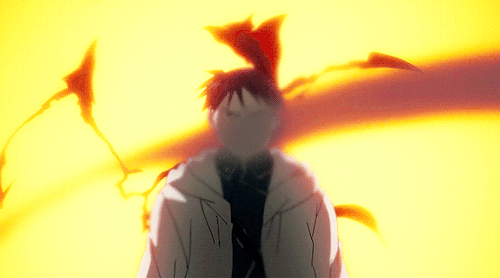
Save Wrath, Riza and Hohenheim, Roy’s origins are not only incredibly intriguing, but actually account for many of his unique skills and personality traits. Growing up under the guardianship of Madame Christmas and her network of spies, it’s easy to see where Roy picked up his effortless ploys of charisma, and the nuances of espionage, also likely an environment where he learned to grow up very fast. His aunt’s connections to Grumman, coupled with the cooperation of his adoptive sisters, not only convincingly fortified his false reputation as a womanizer, but put him in the prime position to receive any range of military intel higher ups would blab to a pretty face. In addition, while the nature of his alchemy is/was known to the Hawkeyes, Roy finds himself in the unique position of not only being its soul bearer, but its last, while painfully aware of the damage his power can inflict, and be exploited by others. Interestingly, while there is a lot of turmoil that separates the idealistic boy that spoke to Riza in front of her father’s grave, and the colonel we see during the Elric’s story, he still deeply cares about the state of the world he lives in and how he can change it. However, time has brought a portion of that sense of justice to the personal level, rendering Roy that much more determined, and that much more unstable.
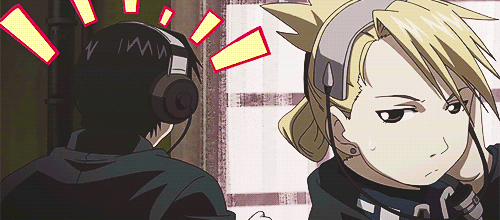
Despite the dark nuances of his past in Ishval, a distinct side of Roy remains remarkably childish and goofy. Forgoing professionalism, he often mirrors Ed’s belligerence in an attempt to enforce his authority, blatantly ignore checks to his own power (i.e. rain) to overcome a problem on his own or assert his own credibility as an alchemist (i.e. that thing where teens think they are invincible), and finds sheer entertainment in tasks he should probably be taking seriously (see above). I’m honestly not quite sure how to define this aspect of his personality. At times quite endearing, I can’t help but think it has something to do with his time spent in Ishval. Is it a coping mechanism? A portion of his teenage self that was sequestered and shut away? Or maybe I’m reading too much into it and he’s just a goof. However, I like to think he only whips it out around people he is truly comfortable with (the Elrics included).

Also, let’s not forget that Roy is incredibly intelligent, and was the youngest state alchemist in history before Ed showed up. He was only 20, I believe, so I can understand his reading of Ed’s personality, and what he could do with his alchemy. He saw a version of himself in Ed, no doubt. He can create explosions large enough to destroy an entire building, yet precise enough to burn a single piece of paper or boil the fluid in Envy’s eyes, even when overcome by rage. Nothing about his alchemy is haphazard or uncalculated. He figures out he can carve a damn transmutation circle in his hand to continue fighting, and has enough medical knowledge to cauterize a serious wound. His skillfully plays within the lines of the Amestrian military, yet all with the intention to turn it around to his advantage. Even when things go wrong, he has his artfully cultivated support system of subordinates, friends, allies, and informants to catch him. Finally, not only is his alchemy more complex than that of any other state alchemists, Roy can perform is blind with little instruction. He’s a calculated strategist, excellent spy, and just plain brilliant.
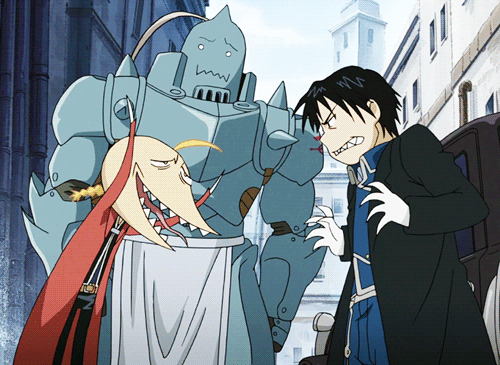
Finally, Roy is the perfect parallel to Ed. They are both idealistic young boys at some point. They’re both hopeful of a better future. They aren’t foils of each other, but exist beautifully together. Roy is Ed, more or less, 15 years older. They both have past sins to atone for, and unlike Father, they learn to embrace them, and become stronger individuals for the future benefit of the communities they surround themselves with. They’re equally serious, and at times, equally immature. Roy has the advantage of age, while Ed has the advantage of time. From what one has done wrong, the other has done right, and they respect and learn from each other. Roy is very protective of the Elric brothers, and encourages them along their quest. Ed, while he makes fun of Roy, looks up to him, and is one of the few to pull him to his sense from the pits of rage. Neither of them are perfect, but despite all the headbutting and jokes, these two are the ultimate allies, examples, and, just let me say, friends.
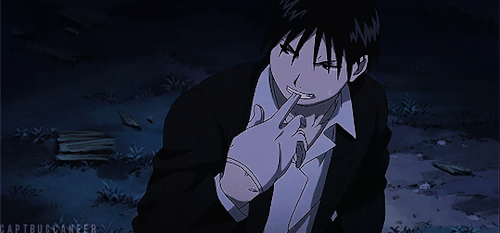
And just as an indulgent side note, Roy is HELLA attractive. I can’t remember who made the post recently, but I sincerely agree with the point of how bafflingly handsome he is. His aesthetic is something I personally go for, so yeah, anime husband. *screams into the void* *the void agrees*
All the people I ship romantically with this character:
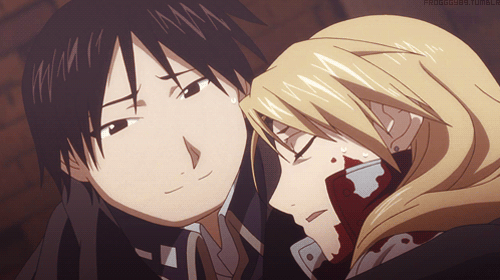
Ummmmmmmmmm. If it isn’t possible to ship royai, I don’t need to exist in this world. Cancel my subscription! I more than ADORE these two. The subtly of their relationship is masterful, and every interaction is honed; built on years of experience, and is beautiful to watch. I adore Roy’s friendship with Maes (see below), but his relationship with Riza is next to none. They are so in sync that they terrify me. It is, honestly a relationship that transcends love. In short, while I don’t always see this in the real world, they are, imo, soulmates. They understand, respect, and love each other. It’s so effortless, the world doesn’t even need an explanation. There are people who get along. There are people who get each other, like Maes and Roy. And then there is the person whose existence fits seamlessly your own, just so. That’s Roy and Riza.
My non-romantic OTP for this character:
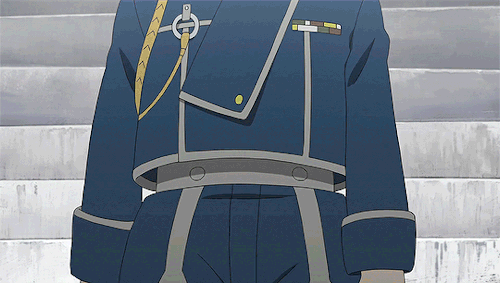
This is the friendship that created the term bromance y’all. I LOVE these two. For two people that became friends over a piece of damn quiche, I will cry over the development of their relationship for the next 10,000 years. Roy and Maes are THE example of a perfect friendship. They support each other in their goals, joke around, know when to be serious, and just plain GET each other. The only other person who could possibly read that deep into Roy besides Riza, is Maes. They went through hell together in Ishval, and came out on the other side with a steadfast promise to fix the state of their country, and to see it ripped apart ENDED me. I have the distinct feeling that Roy looked up to Maes; seeing the future he had, and believing it could be real. He could fall in love, and have a family. He could be happy. Then, it was all torn away. His prophecy on the battlefield came true, and I bet Roy hated himself for it. I bet he despised himself. This is where the inspiration for my fic “Young” came from. (If you want to read, here’s the link.) If the man he cared for the most, the man who had done less wrong than he, not be happy, not be allowed to live, then why should he even consider the possible existence of a brighter future for himself?
My unpopular opinion about this character:
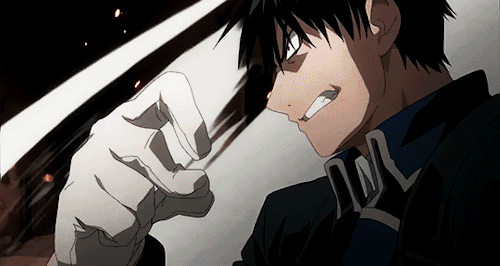
I really wanted to see other emotions from Roy that straight rage regarding his response to Hughes’ death. We get the “today is a terrible day for rain” moment, but for a character as driven by his emotions as Roy, I really expected more outward displays of grief and despair from him over the death of his best friend. Vulnerable Roy is excellent to watch, and honestly, I’d love to see more of it. While both he and Ed are emotionally vulnerable over the course of the series, it’s shown more blatantly in Ed’s corner, even though he doesn’t cry. There are moments where he expresses genuine despair and helplessness, and they are uniquely powerful (see the scene within Gluttony as a prime example). I get that Roy is supposed to appear cold and collected, but the few times his emotions manifest in ways other than rage, are beyond excellent. He doesn’t need to cry, per se, but a few more varied expressions would be more than appreciated.
One thing I wish would happen / had happened with this character in canon:
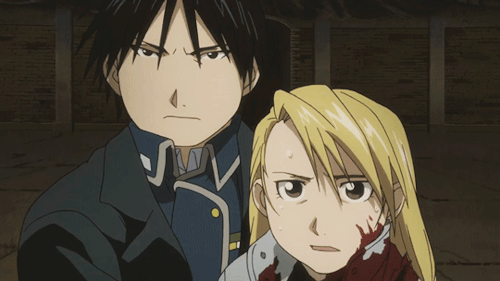
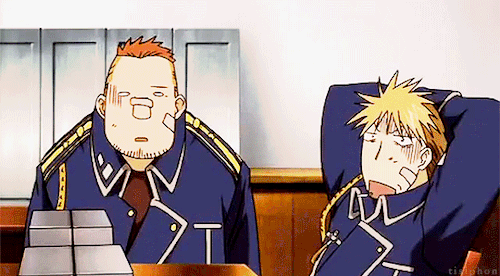
If two (2) things happened, I would be forever happy. First, if Arakawa ever made royai canonically official. *swoons at the mere thought* Second, I need a Team Mustang spinoff series! I need all the office shenanigans, meetings to exchange intelligence gone wacky, initial assembly of the team, flashbacks to Roy’s childhood with Madame Christmas, all the inside jokes about Fuery being the smol son of the group, Havoc’s fail of a love life, Breda’s fear of dogs, and everyone secretly trying to get Roy and Riza together?!?!?! GIVE. IT. TO. ME.
Send me a character, if you dare.
138 notes
·
View notes
Text
Asexuality and Identity
So since it’s the first day of pride I thought I’d share an essay I wrote on, well, asexuality and identity. It’s a bit long and I’m sorry to day I didn’t really get into aro identities, but it covers the ace spectrum instead of just being ace=no sexual attraction, plus it’s written by a bonafide asexual, so I drew from my experiences as well as my research. Anyway if this sounds interesting to you, if you don’t get asexuality and want a better understanding of it, or you just hunger for more posts you can relate to, read below the cut for my full research paper!
What does it mean when someone is asexual? In biology asexuality means a creature can reproduce by itself, but, in a social context, asexuality can mean someone who has no or little sexual attraction to anyone. This new sexual orientation is hard to understand due to it being uncommon and nuanced, and much more complicated than lacking a sex drive. The best way to explain asexuality would be to compare sex and sexual attraction to cake. Cake is something that most people enjoy and actively wish to eat. Some people may want to eat cake most of the time, while others may only have occasional cravings. Being asexual doesn’t mean a person doesn’t mean a person won’t want cake, some asexual individuals are happy to have cake, they just do not crave it. Others will only eat one specific kind of cake from their favorite bakery, while others still may eat it out of courtesy but do not receive pleasure from it one way or another. Then there are what people might think of as “typical” asexual individuals, people who either never eat cake or are disgusted by cake. This analogy is not perfect however it is meant to demonstrate how asexuality is more complex than lacking a sex drive. Asexuality is a sliding scale, like other sexual identities. Many asexual individuals struggle finding and developing their identities. This is partially due to asexuality not being as well recognized as a sexual orientation. It can also be difficult to identify oneself as asexual due to society’s emphasis on sex being a vital part of a relationship and a basic human function. The fear of perceived abnormality in asexuals can cause asexual individuals to deny or delay their identity formation similar to the way other LGBTQ+ individuals have struggled to be accepted in a primarily heteronormative society.
As stated before asexuality is not necessarily the complete lack of sexual desire or attraction, rather there is a sort of continuum people fall upon (Chasin, 2011). Asexuality can be referred to as being on a spectrum upon which there are two important terms. The first being grey-asexual; this is a person who may occasionally experience sexual attraction, and the second being demisexual, which is a person who cannot experience sexual attraction unless they already have a close bond with the person. It is important to understand that these definitions are also very basic, and do not fit every asexual individual. Much of the confusion about asexual identities is rooted in the definitions. The terms seem to be very loosely defined and it is difficult to label a person’s drive and emotions. For some asexual individuals romance can be enjoyable, “‘I enjoy cuddling, and kissing and even pleasing my wife, but I don’t desire sexual intercourse’”(Scott & Dawson, 2015), while others find pleasure from neither; “‘I am sexually attracted to men but have no desire or need to engage in sexual or even non-sexual activity (cuddling, hand-holding, etc.) with them’”(Scott & Dawson, 2015). Asexual individuals may also derive pleasure from sexual behaviors such as masturbation and sexual fantasies, though they may be different from that of a person who is not asexual. Desire for asexual people may not be directed at anyone in particular. In fact a significant number of asexual people mastrubate or have sexual desires that are not specifically targeted at any one particular person (Bogaert, 2015). Many asexual individuals report that they mastrubate as a way of relieving stress, or as a means of maintaining sexual health, instead of deriving pleasure from it as a sexual activity. During sexual fantasies, asexual individuals may feel distanced from the scenario they are creating, “One AVEN participant reported: ‘I almost invariably think of fictional characters. My thoughts have never involved people I know, and they have never involved myself’”(Bogaert, 2012). This isolation from their own sexual fantasies and experiences is fairly common among asexual individuals, and is part of what differentiates asexuality from other sexual orientations. This is how people that identify as asexual can still participate willingly and find pleasure in sex. Unfortunately, these nuances do not completely match the oversimplified definition of asexuality, and this is why many asexual people have trouble identifying themselves as asexual.
As stated before, the nuances of asexuality create an orientation that is difficult to navigate and to find an identity in. Already, many people have trouble accepting the most basic definition of asexuallity such as when “Prause and Graham reported that asexual participants struggled with negative public perceptions of asexuality and pressure to conform to the universal assumption that humans are sexual beings”(Robbins & Low & Query, 2015). Public opinion on asexual individuals often struggles with the belief that sex is an unequivocally human quality and that if a person were to not experience sexual desires then there is something wrong with them. Historically asexuality has been denied or there has been resistance to recognizing it since it does not fit within a heteronormative society’s expectations (MacNeela & Murphy, 2014). This sentiment is hurtful not only because it dehumanizes asexual people, but also because it causes asexual individuals to believe they are broken. “Similar to the experiences of lesbian, gay, and bisexual individuals, it is likely that the distress and psychological symptoms experienced by asexual individuals is secondary to their experience of prejudice and discrimination, rather than asexuality being the result of an underlying psychological disturbance”(Brotto & Yule, 2016). Asexual people not only face similar discrimination that other LGBTQ+ people face, but they have their own unique struggles with trying to sort out an identity in a sexually grey area.
There are many possible reactions an asexual could have to sexual behaviour, and thus it is practically impossible to have words that describe all of them. This creates the grey asexual spectrum. This undefined area makes it considerably harder to carve out an identity. People want words to describe who they are and when there are no words to describe so many unique experiences it can be extremely difficult in finding identity. A problematic area for many asexual individuals is the distinction between romantic attraction and sexual attraction. Often outside of the asexual community, the general population does not understand the difference between the two types of attraction and will often believe sexual orientation matches romantic orientation (Cranney, 2017). Many asexual individuals still feel romantic attraction, so it can be confusing to tell someone you’re asexual, but still attracted to a specific gender. This romantic distinction uses similar wording for sexualities just repurposed for romantic only attraction. For example an asexual individual can be homoromantic, biromantic, heteroromantic, aromantic, and many more. While the asexual community has now embraced these terms to help identify themselves, the public often is unaware of these terms, so it can be hard to find someone who will understand the differences in sexual and romantic attraction. Sometimes this just leads to people being informed of this new vocabulary, however, like with all changes, people push back against these terms and refuse to understand what they mean and how they are different. People want asexuality to be an easy to understand orientation “from this construction emerges the ideal of the "real" asexual in contrast to other asexual individuals who cannot be rightly articulated and who are therefore somehow less legitimate”(Chasin, 2013). While asexual individuals do not always face the persecution other members of the LGBTQ community face, there are still biases that affect the development of an asexual identity. The idea that an asexual person can never feel sexual attraction or want sex creates this standard, that if strayed from, somehow invalidates the asexual identity. Not only is there a struggle to find one’s identity in a society that finds it invalid, but it is often hard for asexual individuals to understand what they themselves are feeling. Trying to identify a lack of feelings is near impossible, so for those that do not experience sexual attraction it can be hard to define their identity when it relies on an absence of something (Bogaert, 2015). There is not only a struggle to define oneself by society's standards but also an internal struggle over understanding why there is a lack of attraction. Puberty is already a confusing time in one’s life and sexuality is often overlooked in education, so if people are never taught what sexual attraction is meant to feel like, it is almost impossible to understand when there are no feelings of sexual attraction. Even if asexual individuals do understand that they don’t experience sexula attraction, it can be hard to accept that fact, “compared with men, women find it more easy to indicate that they are asexual and that the reported gender difference is not a real difference. After all, men are more expected by society to behave sexually, compared with women”(Enzlin & Gijs & Houdenhove & Sjoen, 2014). Finding a personal identity takes a lot of insight into one’s own feelings, and if these feelings are misunderstood or repressed it leads to confusion later in life. As Erikson would believe, identity development as a young adult is imperative, and without properly forming an identity people become confused and have a weak sense of self in later years. Identities allow people to more easily connect with others by uniting them with a common bond. A well developed sense of identity also allows people to more easily understand when they are struggling in life and need to seek help. However for many asexual people, they go much of their life without understanding their entire identity which causes strain on their mental well being and interpersonal relationships.
As one might expect, most likely the largest problem posed by asexuallity is trying to balance a relationship with someone who is not asexual. In Bogaert’s first study, he found that only about 1% of the population identifies as asexual (Bogaert, 2004), so it is likely many asexual individuals who are seeking out romantic relationships will date someone who is not asexual. Many non asexual people might think relationships require sexual attraction however, “asexual people may serve as an exemplar that sex/lust and love/romance are, at least partially, separable constructs and can be “de-coupled” in individuals, given that many asexual people evince romantic attraction without sexual/lustful attractions”(Bogaert, 2016). While some asexual individuals are also aromantic - they do not feel romantic attraction - many wish for romantic relationships and find fulfilling partnerships with both asexual partners and non asexual partners. However, “as might be expected, asexual/non-asexual couples face exaggerated discrepancies between each partners' level of sexual desire”(Chasin, 2013). It can be tough for couples to work out their sexual differences, especially since for non-asexual individuals, abstaining from sex is denying an important part of their identity, just as forcing an asexual person to have sex would be denying their identity. Some couples choose to work this out by having an open relationship, so when the non-asexual partner desires to have sexual relations with someone, both parties have agreed that they can have sex outside of their relationship. Sometimes an asexual person will agree to have sex with their partner “the asexual person may accommodate to his or her partner’s desire for sex, or agree with them (sometimes explicitly) an alternative way of demonstrating intimacy”(Scott & Dawson, 2015). Contrary to popular belief many asexual individuals are not sex repulsed and will have sex with their partner, much the same way someone may cook for their partner. It may not be something they are passionate about, but they will perform the task out of love for their partner. Similarly, asexual people may use sexual actions as a way to relieve stress, “I do not have any desire to have sex with another person. I masturbate at times but I don’t connect it with anything sexual. I know it sounds like a contradiction but it’s just something I do every now and then and it seems to help me relax when I am stressed”(Scherrer, 2008). This is a common trend seen among asexuals, where they will perform sexual acts, but instead of performing them because of desire, they are used as more of a maintenance for the body.
While it is entirely possible for asexual people to have relationships similar to that of non-asexual people, in this new era of sexual identities, the very structures of relationships are changing. There is a higher rate of aromantic individuals within the asexual population (Bogaert), which means not only does this subset not seek out sexual companionship, but neither do they require romantic relationships. This begs the question, what kind of relationships do these people seek out? For many the relationships they seek are platonic in nature and many asexual/aromantic individuals are happily content to surround themselves with close friends (Scott & Dawson, 2015). As reported in one survey Alex, an aromantic asexual had this to say about his relationships, “‘an ideal relationship for me is a close friendship, where we can be accountable to each other. No kissing, hugging, or anything else. Just a mental and emotional relationship’”(Scherrer, 2008). Being able to find a stable relationship is a large part of forming an identity, all relationships throughout one’s life helps create an identity, and finding a lifelong partner is a big step in identity development. Once an aromantic and/or asexual person can begin to understand their sexual and romantic identity, they can take that step forward to find relationships that they are happy in. Like in all relationships, communication is key and it’s best to be open and honest about sexual identities with a potential partner as that will lead to a more fulfilling relationship. Many people assume aromantic and asexual people are incapable of having meaningful relationships, but as these studies have shown the relationships these people do have are different, not nonexistent.
The world is a constantly changing place, and as more diverse sexual identities are recognized, people can start to find their personal identities all the more easier. While asexuality may be a fairly new concept, even compared to other sexual orientations, it has quickly become adopted as a legitimate sexual orientation in ever growing circles both on the internet and in the world. As with any deviation from the norm, asexuality has been criticized in many of the same ways homosexuality and bisexuality were, and still are. While asexual people still face many hurdles when seeking an identity, with the more exposure this sexual identity gets, the easier it will be for people in the future to sort out their feelings and come to terms with their identity. The way society’s views of sexuality are shifting in this modern era it is increasingly likely that someday developing a healthy sexual identity by young adulthood will no longer be the struggle against social norms that it is currently.
153 notes
·
View notes